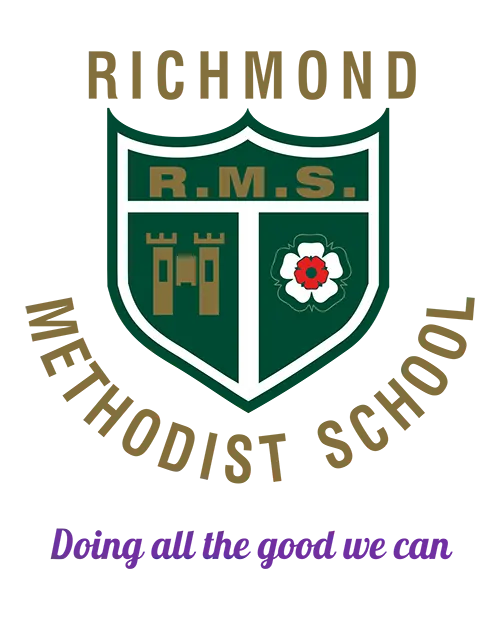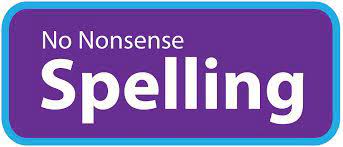Our Curriculum
At Richmond Methodist Primary and Nursery School, our sequential curriculum enables children to ‘know more and remember more’ by regularly ‘revisiting and recalling’ core knowledge. Knowledge is incrementally built in small chunks from Early Years to Year 6 and consolidated through ‘deliberate practice’, ensuring that key facts are transferred into long-term memory. Our children therefore become fluent learners who can draw on connected knowledge and apply it in context.
This is how we learn at RMS. This is our learning cycle.
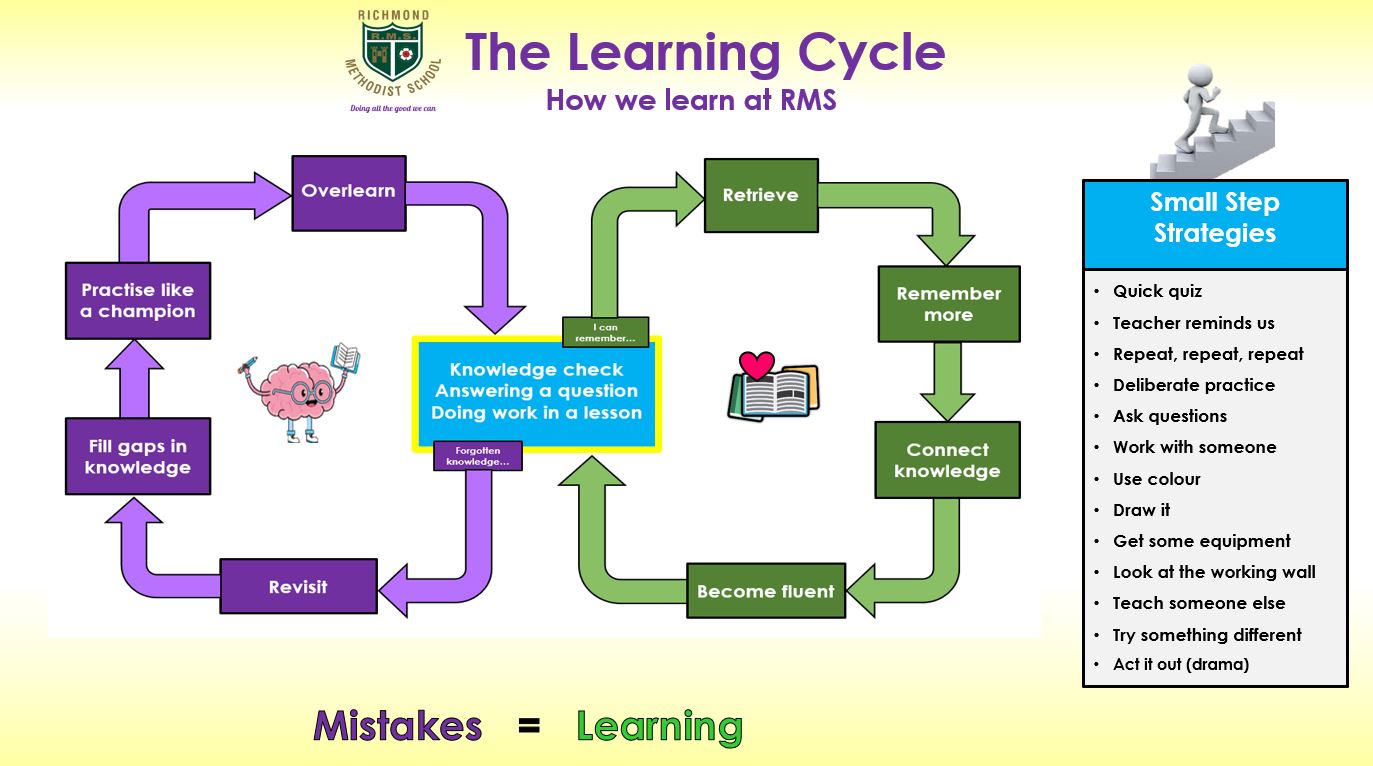
Our broad and deep curriculum is underpinned by our school vision of ‘doing all the good we can’. Our RMS curriculum not only advances children’s academic progress but our exceptional enrichment opportunities also develop children’s cultural capital and personal development by valuing ‘all’ endeavours and encouraging them to become the best version of themselves. Our curriculum empowers ‘all’ children to have a strong voice, to be aspirational about their own future and to leave a legacy for the school, the community and the wider world.
Assessment
Our teaching staff deliver quality-first teaching and staff-expertise is utilised effectively to ensure different subjects areas are taught by experts. Our assessment culture is based on assessment for learning with quality verbal feedback. Knowledge checks and low-stakes quizzes allow teachers to identify and consolidate gaps in current knowledge before moving on. Our approach reduces cognitive overload for pupils and reduces workload for staff.
We have a system of two-week knowledge checks in each subject, assessing only the content that has been taught. Forgotten knowledge or gaps in knowledge are identified, and the whole class or groups are targeted, and that knowledge is re-taught until secure.
We have three summative data drops per academic year: at the end of the Autumn, Spring and Summer terms for reading, writing, grammar, punctuation, spelling and maths. We use NTS assessments for children in Year 1 – 6.
Our curriculum is based around the National Curriculum 2014 and the Equalities Act 2010
Overview
The national curriculum is a set of subjects and standards used by primary and secondary schools so children learn the same things. It covers what subjects are taught and the standards children should reach in each subject.
Follow this link to the Department of Education website.
Please use the links below to find out what our children will be taught.
Our Curriculum
please expand the topics below for more information
Art and Design
Intent
Here at RMS, our aim is to ensure that children are confident approaching artwork, feel a strong sense of achievement, value the impact of art within their own lives and are able to reach their full potential – ‘doing all the good they can’. Our high-quality art and design education ‘for all’ engages, inspires and challenges children, equipping them with the knowledge and skills to experiment, invent and create their own works of art, craft and design. Our children are encouraged to think critically and develop a rigorous understanding of how art and design both reflect and shape our history and contribute to the local, national and worldwide culture and creativity.
Implementation
Our Art and design curriculum is structured in a mixture of half termly and termly units. We teach the equivalent of one lesson per week but the length of the lessons vary based on the learning activities children are undertaking and may include enrichment afternoons or days.
Children learn and develop a wide range of knowledge, skills and techniques within their art and design lessons. They learn about local, national and European artists as well as artists, architects and designers from other cultures. Our children learn about artists and designers both in history and those alive today. You can see children’s developing ideas, progress and pieces of artwork in the sketch books that they keep throughout the school.
The National Curriculum for art and design aims to ensure that all pupils:
- produce creative work, exploring their ideas and recording their experiences
- become proficient in drawing, painting, sculpture and other art, craft and design techniques
- evaluate and analyse creative works using the language of art, craft and design
- know about great artists, craft makers and designers, and understand the historical and cultural development of their art forms.
Impact:
Our high-quality, knowledge-rich, sequential art and design curriculum equips children with the knowledge, skills, creativity and cultural capital to flourish as individuals and make a positive difference for each other; their families; our community and the world.
Summative assessments take place throughout the year and teachers record the progress and attainment against the National Curriculum expectations of attainment on FFT Curriculum Tracker. Teachers use this information to inform future lessons; ensuring children are supported and challenged appropriately.
British Values
At RMS our values are underpinned by the British values of Individual Liberty, Democracy, The Rule of Law and Mutual Respect and tolerance. We ‘Do all the good we can’, we are ‘Ready, Mutually Respectful and Safe’ and our school’s ethos is that we welcome and are ‘for all’.
The over-arching British Values feed directly into our whole school values, underpinned by our Christian Values and form the core basis of or commitment to equality. We support and champion the nine protected characteristics, detailed in the Equality Act; age, disability, gender reassignment, marriage and civil partnership, pregnancy and maternity, race, religion or belief and sex.
We feel this focus on Christian, yet also global generic values, provides preparation for an appreciation of life and each other in modern Britain. This runs along side our learning about people, faiths and cultures both within and beyond Richmond.
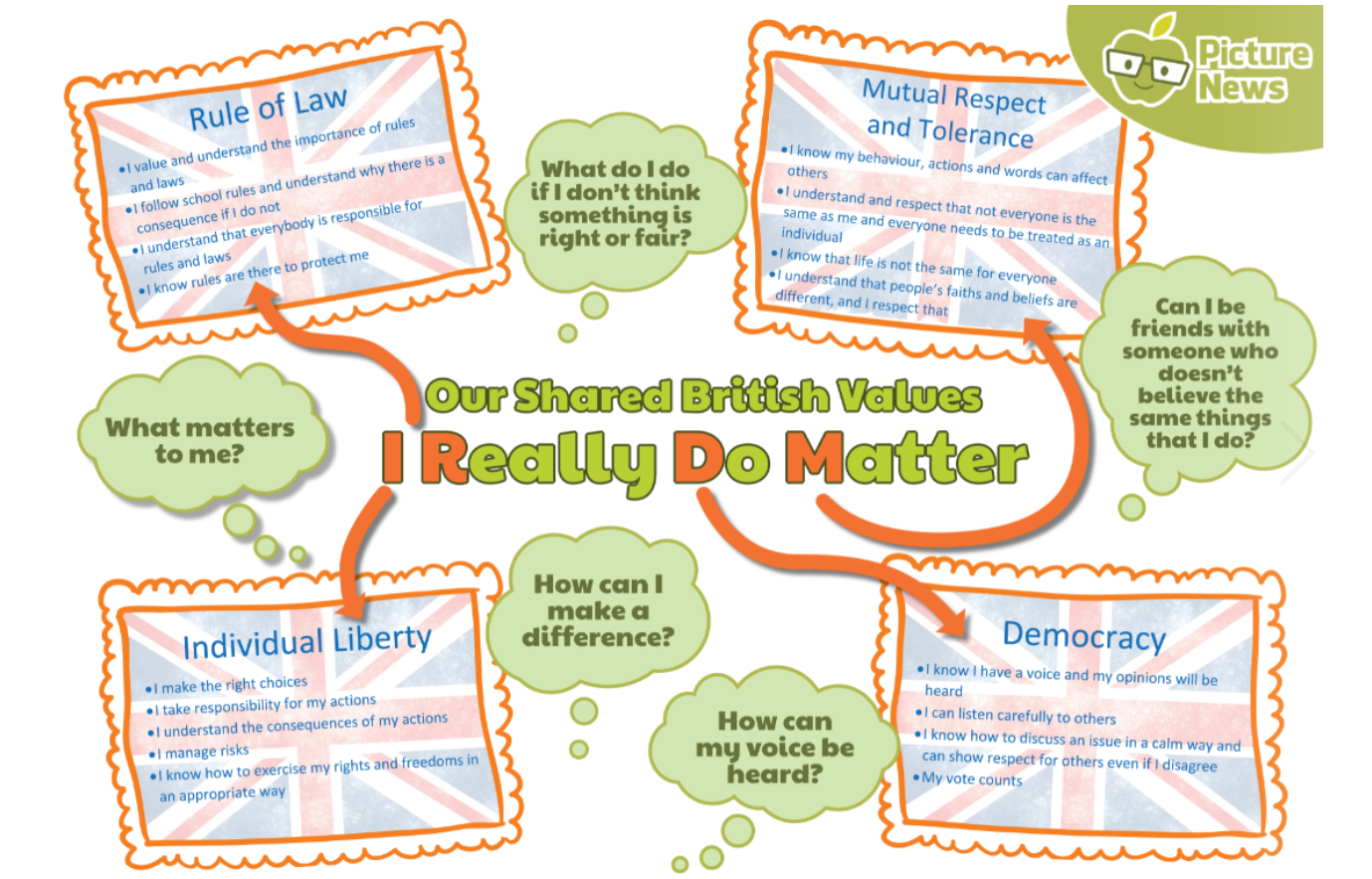
Computing
Intent:
Here at RMS, we aim ‘for all’ children to develop computing confidence and become, responsible, competent, confident and creative users of information and communication technology. Our whole school ethos and aim is for all of our children to be ‘Ready, Mutually Respectful and Safe’ and this is no better demonstrated than in our Computing Curriculum offer. Through a sequential and progressive skills curriculum, we aim to equip all our children with the necessary knowledge and understanding of current technologies to enable them to ‘do all the good they can’, and as technologies develop, enable them to thrive within a global network and digital future. We aim that all children use technology safely and respectfully, keeping personal information private and can identify where to go for help and support when they have concerns about content or contact on the internet and other online technologies.
Implementation:
Our whole curriculum including Computing is designed ‘for all’ to access and succeed. Our equality vision is built on championing fairness and ‘doing all the good we can’ to enable every child to meet their potential and therefore ‘do all the good they can’, both now and in the future. We use technology to enable equal access to aspects of our broad and balanced curriculum by scaffolding and promoting equality of opportunity, closing gaps and building confident engagement in learning.
Computing has deep links with mathematics, science, and design and technology, and provides insights into both natural and artificial systems. The core structure of our computing curriculum is computer science, in which pupils are taught the principles of information and computation, how digital systems work, and how to put this knowledge to use through programming. We encourage enquiry based and problem-solving approaches which will provide life-long skills in preparation for the technological future, whatever that may look like.
Children are encouraged to ask questions and find solutions. Building on their knowledge and understanding, pupils are equipped to use information technology to create programs, systems and a range of content. Our computing curriculum is taught within a context and purpose. Classrooms are equipped with an up-to-date screen and laptop, whole class sets of laptops and ipads are available.
Children are encouraged to increase their subject knowledge vocabulary and use their increasing skills to communicate more effectively with a wider audience. In RMS, Computing is taught as a stand alone subject and used to enable and deepen learning in other subjects such as English and Mathematics. Children are taught to respect the online community, behave responsibly and keep, at all times, both themselves and each other safe. This is in line with our ‘Ready, Mutually Respectful and Safe’ school ethos.
Impact
A high-quality computing education equips ‘all’ pupils to use computational thinking and creativity to understand and change the world. Our children will be well-placed to take up their responsibilities as global citizens, ‘doing all the good they can’. Computing also ensures that pupils become digitally literate, able to use, express themselves and develop their ideas through information and communication technology. This will be at a level suitable for the future workplace and our RMS children will be enabled to be active, responsible and respectful participants in a digital world. They will be ‘Ready, Mutually Respectful and Safe’.
Please click here to view the Two year curriculum overview for Computing
Design and Technology
Two Year Curriculum Overview – DT
Intent
Our RMS design and technology curriculum is ‘for all’. We do ‘all the good we can’ to ensure our teaching and learning is inspiring, rigorous and practical and accessible ‘for all’. The children acquire a broad range of subject knowledge and draw on disciplines such as mathematics, science, engineering, computing and art.
The National Curriculum for design and technology aims to ensure that all pupils:
- develop the creative, technical and practical expertise needed to perform everyday tasks confidently and to participate successfully in an increasingly technological world.
- build and apply a repertoire of knowledge, understanding and skills in order to design and make high-quality prototypes and products for a wide range of users.
- critique, evaluate and test their ideas and products and the work of others.
- understand and apply the principles of nutrition and learn how to cook.
Our children will acquire ‘sticky knowledge’ and will retain this knowledge in their long-term memory as life-long learning so they can always respond to new challenges, understand problems and create solutions. We aim to equip our children with the relevant and useful skills which they can then utilise to ‘do all the good they can’ in a rapidly changing world.
Implementation
Using creativity and imagination, pupils design and make products that solve real and relevant problems within a variety of contexts, considering their own and others’ needs, wants and values.
Through the evaluation of past and present design and technology, the children develop a critical understanding of its impact on daily life and the wider world.
The children will be taught through the main characteristics of: Designing, Making, Evaluating, Using Technical Knowledge and Food Technology.
At Key Stage 1, children will design purposefully based on design criteria. They will generate, develop, model and communicate their ideas through talking, drawing, templates, mock-ups and, where appropriate, information and communication technology. They will make, selecting from a range of tools and equipment, materials and components. The children will evaluate by exploring existing products and evaluating but also reflecting on their own creations against design technology. The children will increase their technical knowledge by building structures and mechanisms, exploring how they can be made stronger, more efficient and more stable.
At Key Stage 2, children will use research and develop design criteria to inform the design of innovative, functional, appealing products which are fit for a purpose. They will generate, develop, model and communicate their ideas through discussion, annotated sketches, cross-sectional and exploded diagrams, prototypes, pattern pieces and computer aided design. They will make by selecting from a wide range of tools, equipment, materials and components. The children investigate and analyse a range of existing products. They will evaluate their own and other’s work, using collaboration to improve. They will understand how key events and individuals in design and technology have helped shape the world. Children will develop technical knowledge and they apply their understanding of how to improve more complex structures. They will understand and use electrical systems in their products and apply their understanding of computing to programme, monitor and control their products.
The principles of cooking, nutrition and healthy eating will be taught in both key stages.
Design and Technology will be taught weekly or as a block of lessons, as appropriate.
Impact
By the end of each key stage, all pupils will know, apply and understand the matters, skills and processes specified in the programmes of study.
Instilling a lovely of cooking in pupils will open a door to one of the great expressions of human creativity. Learning how to cook is a crucial life skill that enables pupils to feed themselves and others affordably and well, now and in later life.
Our high-quality design and technology education is ‘for all’ so all can make an essential contribution to the creativity, culture, wealth and well-being of the nation as our children ‘do all the good they can’, both now and in the future.
Geography
Curriculum Intent:
Our RMS geography curriculum is ‘for all’. We do ‘all the good we can’ to inspire pupils with knowledge, understanding and curiosity about the world, as well as their place in it. It allows pupils to develop a knowledge about diverse places, people, resources and natural and human environments, together with a deep understanding of the Earth’s key physical and human processes. Children’s increasing geographical knowledge will help them to deepen their understanding of the interaction between physical and human processes, and of the formation and use of landscapes and environments. The curriculum is designed to have a balance of core knowledge (facts, location, vocabulary) and a sense of place (senses, emotions, values, opinions). This allows children to develop a knowledge and understanding of real places as well as how people affect the environment and are influenced by it. At RMS we strive ‘to do all the good we can’ to enable children to develop a deep understanding and appreciation of their locality, and their place withing the wider world, that will remain with them for the rest of their lives.
Implementation
Geography is taught in blocks throughout the year, so that children achieve depth in their learning. Teachers have identified the key knowledge and skills of each topic and consideration has been given to ensure progression across topics throughout each year group across the school. Our curriculum has been sequenced to enable pupils to gradually widen their sense of scale from their immediate geography to the global. In EYFS children begin to gain an understanding of their immediate environment and the people and communities around them. In KS1 children will begin by looking at the local environment before moving on to study and compare the wider world. In lower KS2, children explore the United Kingdom and Europe. In upper KS2, pupils will look at the world on a global scale, including studying how the landscape is shaped by both the environment and by peoples’ actions. Throughout KS1 and KS2, map and fieldwork knowledge is developed through a series of fieldwork enquiries. Children will have opportunities to interpret a range of sources of geographical information, including maps, diagrams, globes and aerial photographs.
Impact
Over time, our children will develop a contextual knowledge of globally significant places, both terrestrial and marine, including their defining physical and human characteristics and how these provide geographical context for understanding the actions of processes. They will understand the processes that give rise to key physical and human geographical features of the world, how these are interdependent and how they bring variation and change over time. Our children will be competent in the geographical skills needed to: collect, analyse and communicate with a range of data gathered through experiences of fieldwork that deepen their understanding of geographical processes. They will be able to interpret a range of sources of geographical information and communicate their geographical information in a variety of ways. Our children will be equipped to appreciate the wonderfully, diverse world around them, both now and throughout their lives, to continue ‘doing all the good they can‘ to protect our Earth and to preserve it ‘for all‘.

| Year 1/2 |
Autumn A Why is Richmond Special? |
Spring A What’s it made of and why?
|
Summer A How do people tell their stories? |
Autumn B How do I care for my body and mind? |
Spring B What makes a good home? |
Summer B Why is our environment precious? |
| Locational Knowledge | Know that names of the four countries that make up the UK and its surrounding seas. |
Know the names of and locate the four capital cities of England, Scotland, Wales and Northern Island.
I can talk about the characteristics of the four countries and capital cities. |
Name and locate the world’s seven continents and five oceans.
|
|||
| Place Knowledge |
Know the main differences between city, town and village; coastal and rural area.
Explain some of the advantages and disadvantages of living in a city or a village. |
Compare similarities and differences of a local city/town in the UK with a contrasting area in a different non-European country
|
||||
| Human and physical geography |
|
Know which is the hottest and coldest season in the UK.
Know and recognise main weather symbols.
Identify seasonal and daily weather patterns in the UK. |
Identify key physical features: beach, cliff, coast, forest, hill, mountain, sea, ocean, river, soil, valley, vegetation, season and weather.
Identify key human features: City, town, village, factory, farm, house, office, port, harbour and shop.
Compare and contrast the human and physical features of two British localities, including how the land use differs in each locality. |
Know where the equator, North Pole and South Pole are on a globe.
Identify seasonal and daily weather patterns in hot and cold areas of the world.
Know physical and human features of hot and cold places of the world.
|
||
| Geographical skills and fieldwork |
Use simple compass directions (North, South, East and West) and locational and directional language (e.g. near, far, left, right) to describe the location of features and routes on a map.
Draw simple map; and use and construct a basic key.
Use simple fieldwork and observational skills to study geography of their school and its grounds and the key human and physical features of its surrounding environment. |
Use world maps, atlases and globes to identify the United Kingdom and its countries. |
Use aerial photographs and plan perspectives to recognise landmarks and basic human and physical features
|
Use world maps, atlases and globes to identify the United Kingdom and its countries, as well as the countries, continents and oceans studied at this key stage. | ||
| Year 3/4 |
Autumn A Why is Richmond special? |
Spring A What is beneath us and why does it matter? Sci – rocks and magnets
|
Summer A How do we get our message across? |
Autumn B How do I care for my body and mind? Sci – skeleton and muscles Digestive |
Spring B Why is history worth knowing? |
Summer B How can I have my say? |
| Locational knowledge |
Know the names of and locate at least 8 counties and at least 6 cities in the UK.
Identify human and physical characteristics, key topographical features (including hills, mountains, coasts and rivers) and land-use patterns; and understand how some of these aspects have changes over time.
To locate Richmond on a range of world, European, UK and regional maps
To understand the geographical features of Richmond and North Yorkshire
|
Know the names of 4 countries from the southern and four from the northern hemisphere.
Know the names of a number of the world’s highest mountains.
Use the maps and globes to locate the equator, the Northern and Southern hemisphere, Tropics of Cancer and Capricorn and the Arctic and Antarctic circles.
Know what is meant by the term Tropics.
|
Know the names of and locate at least 8 European countries.
|
Know the name of and locate a number of the world’s longest rivers.
Know, name and locate the main rivers in the UK.
|
|
|
| Place knowledge | I can describe how the locality of Richmond has changed over time. |
Describe geographical similarities and differences between the UK and a European country.
|
||||
| Human and physical geography | I can describe the key aspects of physical geography including rivers and mountains, and human geography including types of settlement and land use of a region of the United Kingdom (Richmond/North Yorkshire) |
Understand and describe key aspects earthquakes, volcanoes, and mountains.
|
Know and label the main features of a river.
Explain the features of a water cycle.
Know why most cities are located by a river.
|
|||
| Geographical skill and fieldwork |
Use fieldwork to observe, measure, record and present the human and physical features in the local area using a range of methods, including sketch maps, plans and graphs, and digital technologies.
|
Use maps, atlases, globes and digital/computer mapping to locate countries and describe features studied.
|
use maps, atlases, globes and digital/computer mapping to locate countries and describe features studied |
Use maps, atlases, globes and digital/computer mapping to locate countries and describe features studied.
use fieldwork to observe, measure, record and present the human and physical features in the local area
|
Know and name the eight points of a compass.
To use 4 figure grid references
To identify and use symbols and a key on a map
To make maps, sketches and plans
|
|
| Year 5/6 |
Autumn A Why is Richmond special? |
Spring A Where does it come from and where does it go?
|
Summer A How do words make us feel? |
Autumn B How do I care for my body and mind? |
Spring B What legacy will I leave behind? |
Summer B What makes a colourful world? |
| Locational knowledge | Know the location of major rivers, mountains and cities of the UK |
|
Know the names of and locate some of the world’s deserts.
Know about latitude, longitude, the Prime/Greenwich Meridian, time zones (including day and night) and work out differences.
|
Know the names of and locate some of the countries and cities of the world. |
Know the names of, and locate, a number of South or North American countries.
|
|
| Place knowledge | Explain how locations around the world are changing and explain some of the reasons for change. |
Know key differences between living in the UK and in a country in either North or South America.
|
||||
| Human and physical geography |
Know what is meant by climate zones, biomes and vegetation belts.
Know the features of a specific biome.
|
Know main human differences between developed and third world countries including types of settlement and land use; economic activity including trade links and distribution of natural resources including energy food, minerals and water
Identify and describe how physical features affect human activity within a location
|
Label layers of a rainforest and know what deforestation is.
Know how to use graphs to record features such as temperature or rainfall across the world and how to analyse these statistics.
|
Identify human and physical characteristic features of countries in North or South America (including topographical features and land-use patterns) and understand how some of these aspects have changed over time.
Explain how countries and geographical regions are interconnected and interdependent.
|
||
| Geograhical skill and fieldwork |
To use 6 figure grid references
To identify and use symbols and key on an Ordnance Survey map
Use different types of fieldwork to observe, measure and record the human and physical features of the local area.
|
I can create maps of locations identifying climate zones. | Analyse and give views on effectiveness of different geographical representations of a location (such as aerial images compared with maps and topological maps) |
Record and present results in a range of ways.
|
Use a range of geographical resources to give descriptions and opinions of the characteristic features of a location
|
History

|
Year 1/2
|
Autumn A Why is Richmond Special? |
Spring A What’s it made of and why?
|
Summer A How do people tell their stories? |
Autumn B How do I care for my body and mind? |
Spring B What makes a good home? |
Summer B Why is our environment precious? |
|
Chronology |
Know how the local area is different from the way it used to be a long time ago.
|
Recognise and use a timeline. |
Order a number of artefacts by age
|
Use dates to talk about people or events from the past.
|
Know where the events they study fit within a chronological framework
|
Use dates to talk about people or events from the past. |
|
Characteristic features of period/society studied |
Know significant historical events, people and places in their own locality – Castle, Alan Rufus
|
Know what toys and games their parents and grandparents played with.
Know about aspects of childhood when their parents and grandparents were young.
|
|
|
Know about an event or events that happened long ago, even before their grandparents were born – Great Fire of London |
Know about a famous historical event or place from outside of the UK and explain why they are famous –The Moon Landing & Neil Armstrong |
|
Historical concepts Continuity and change Cause and consequence Significance Similarities& differences
|
Know some parts of/buildings in Richmond have stayed the same and some have changed.
|
Know the main similarities differences between their lives and that of their parents and grandparents (e.g. school, home, toys)
Know that the toys their parents and grandparents played with were often different to their own but that some toys and games are still played today. |
Understand that the holidays their grandparents had were different from their own.
Understand how travel and transport have changed where people holiday.
|
Name 2 famous people and explain why they are famous -Florence Nightingale and Mary Seacole
Compare aspects of life in different time periods
|
Recognise why people did things, why events happened and what happened as a result.
Know what we use today instead of a number of older given artefacts (Fire service/equipment) |
Know the significance of Neil Armstrong
|
|
Historical Enquiry Evidence &interpretation. How and why contrasting views arise |
How has the Richmond changed over time?
Use old photographs of Richmond to identify changes in the local area.
|
Identify different ways in which the past is represented.
Ask and answer questions using sources to show their understanding |
|
To research the life of a famous person using different sources to help me.
|
Did the Great Fire make London a better or worse place?
Understand some of the in which we find out about the past and identify different ways it is presented.
|
|
|
Perspective Connections local/national/ international Cultural, economic, military, political, religious and social |
|
Find out about the past by talking to an older person
|
Know some popular holiday places locally, nationally and internationally in the past and today |
|
|
Know different countries involved in space exploration.
|
|
Year 3/4
|
Autumn A Why is Richmond special? |
Spring A What is beneath us and why does it matter? |
Summer A How do we get our message across? |
Autumn B How do I care for my body and mind?
|
Spring B Why is history worth knowing? |
Summer B How can I have my say? |
|
Chronology |
Order buildings in the in the local area according to when they were built. Know when the Georgian period is on time line in relation to other periods of history studied. |
|
Use a timeline within a specific time in history to set out the order things happened.
|
Understand the concept of changes of time, representing this, along with evidence on a timeline.
Create timelines which outline the development of crime and punishment |
Name and place on a timeline some of the advanced societies that were in the world around 3000 years ago
|
Place events, artefacts and historical figures on a timeline using dates.
|
|
Characteristic features of period/society studied |
Know key features of Georgian architecture and entertainment |
Know characteristic features of Ancient Greece, including ideas, beliefs, attitudes and experiences of men women and children. |
Know that punishments for rich and poor were often different. |
Know about the key features of Ancient Egypt
Know about the gods and beliefs of Ancient Egypt
|
Know about at least one famous Roman emperor.
Know there was resistance to the Roman occupation and know about Boudicca |
|
|
Historical concepts Continuity and change Cause and consequence Significance Similarities& differences
|
Know how building use has changed over time. Observe the effect of Georgian architecture on Richmond today Know what life was like in Georgian times compared to today. |
Know what happened at the Battle of Marathon and the events that happened after
Compare life in Athens and Sparta
|
Know how crime and punishment changed from Roman times to the present day
Know why there were certain crimes and punishments in different time periods
To make comparisons between historical periods |
Know about the significance of the River Nile to development of Ancient Egyptian civilisation |
Know how Britain changed from the Iron Age to the end of the Roman occupation
Identify similarities and differences between the Romans and the Celts
|
|
|
Historical Enquiry Evidence &interpretation. How and why contrasting views arise |
Which periods in history have had the most impact on Richmond?
Identify and use different types of evidence
|
Why are there so many version of the Battle of Marathon?
Analyse and discuss different sources.
Understand why different versions of historical events may occur. |
Use evidence to ask questions and find answers to questions in the past.
|
Did slaves build the pyramids?
Use more than one source of evidence to gain a more accurate understanding of history
Analyse and discuss different forms of evidence.
Recognise the part that archaeologists have in helping us understand more about the past. |
Use more than one source of evidence to gain a more accurate understanding of history
Compare and contrast different forms of evidence
|
|
|
Perspective Connections local/national/ international Cultural, economic, military, political, religious and social
|
Know certain places in our locality have national and international significance. |
|
Know how crime and punishment of the past has influenced our justice system today |
Know that life in Britain at this time was very different to Ancient Egypt. |
Know how the Roman occupation of Britain changed and helped to advance British society
Give reasons why the Romans wanted to invade Britain. |
|
|
Year 5/6 |
Autumn A Why is Richmond special?
|
Spring A Where does it come from and where does it go?
|
Summer A How do words make us feel? |
Autumn B How do I care for my body and mind? |
Spring B What legacy will I leave behind? |
Summer B What makes a colourful world? |
|
Chronology |
Chronology of the castle and it’s changing usage (Georgian period tourist attraction – painted by famous artists, Victorian barracks, conscientious objectors)
|
Use a timeline to show when the Anglo-Saxons were in England
|
|
Understand that that the Stone Age, Bronze Age and Iron Age have a larger duration period than remainder of British history.
|
Create an overview of where and when the first civilizations appeared and how they relate to each other
|
Use dates and historical terms accurately when describing events |
|
Characteristic features of period/society studied |
Know about life in Norman times and the feudal system |
Know that during the Anglo-Saxon period Britain was divided into many kingdoms
|
To know where the Vikings originated from and key aspects of Viking life
|
Know how people in Britain lived during the Stone, Bronze and Iron
Know what is meant by hunter-gatherers |
Know about, and name, some of the advanced societies that were in the world around 3000 years ago (Ancient Egypt, Ancient Sumer, Indus Valley, Shang Dynasty)
|
|
|
Historical concepts Continuity and change Cause and consequence Significance Similarities& differences |
Know how the lives of wealthy people were different from lives of poorer people during this time Know how the use of the castle has changed over time |
Know about how the Anglo-Saxons attempted to bring about law and order into the country
|
Know about Anglo-Saxon kings during the Viking period Know why the Vikings frequently won battles with the Anglo-Saxons
|
Know how Britain changed between the beginning of the Stone age and the Iron age Identify and describe reasons for, and the results of events and changes
|
Know and compare some of the achievements of the earliest civilizations
|
Know about the impact of the Mayan civilization
|
|
Historical Enquiry Evidence &interpretation. How and why contrasting views arise |
How can the Castle tell us about Richmond’s history?
|
Who was buried at Sutton Hoo?
Make inferences from artefacts
Realise the difficulty of being certain in history when using artefacts.
Give more than one reason to support a historical argument |
Know interpretations can only be made on what is known about a period of time.
Recognise concepts of history can change when new evidence is found.
|
What can we learn about life in the Stone Age from a study of Skara Brae?
Recognise that the past is represented and interpreted in different ways and give reasons for this
|
|
Use a wide range of sources of evidence to deduce information about the past.
|
|
Perspective Connections local/national/ international Cultural, economic, military, political, religious and social
|
Identify other local castles in the area. Why were so many built in North Yorkshire at this time? |
Know that the way the kingdoms were divided led to the creation of some of our country boundaries today |
Identify Viking place names |
Know that during this time in Britain there were more advanced societies in the world. |
|
Know why the Mayans were considered an advanced society in relation to the period of time in Europe
|
Maths
Intent:
At RMS we believe Mathematics is a creative and highly interconnected discipline, developed over centuries and which provides the solutions to some of history’s most intriguing problems. We aim to enable our children to seek answers to questions and throughout their life, ‘do all the good they can’ to understand the world around them. For this we aim to provide a high-quality mathematics education and therefore, the ability to reason mathematically. We aim to teach our children that Mathematics is ‘for all’ and through it all can appreciate the beauty and power of Mathematics, a sense of enjoyment and a life-long curiosity about the subject.
Implementation
Through our maths curriculum which is accessible ‘for all’, we equip ‘all’ children with the knowledge and skills that they will need throughout life. Children will engage with varied and frequent practice on increasingly more complex problems over time, so that they have conceptual understanding and are able to recall and apply their knowledge rapidly and accurately. They will develop processes and secure understanding. Children will follow a line of enquiry, conjecturing relationships and generalisations, and learn to develop an argument, justification or demonstrate proof using mathematical language. Our children will apply their mathematics to a variety of routine and non-routine problems with increasing sophistication, including breaking down problems into a series of simpler steps and persevering in seeking solutions. Resilience and a ‘Can do’ attitude are key. Our school mantra is ‘Mistakes = Learning!’.
We engage ‘all’ children through whole class teaching for mastery, using the concrete, pictorial, abstract where appropriate to develop the children’s mathematical understanding and using fluency, reasoning and problem-solving activities to deepen learning and enable all children to ‘do all the good they can’.
Impact
Our children will be able to solve problems, both mathematical and otherwise, simple and more complex. This dexterity to make connections in their thinking and reasoning will be complemented by a secure foundation of known facts. All of our children will become confident and fluent in the fundamentals of mathematics. They will be able to reason mathematically, both individually and as part of a team, listening to others and reconstructing their own thinking. They will be skilled in using discussion to probe and remedy misconceptions. Our children will be able to choose specific vocabulary so they can explain their thinking processes and conclusions, presenting a mathematical argument or proof as they ‘do all the good they can’ in making sense of the wonderful mathematical world around them.
Modern Foreign Languages
Intent:
At Richmond Methodist Primary School, we aim to stimulate children’s curiosity about languages and cultures from around the world, with a particular focus on French language and culture. We aim to liberate our children from insularity and provide an opening to other cultures. This mirrors our whole school ethos of inclusion and we aim to construct an appreciation ‘for all’ of ‘all’ who live in our local and global community.
We aim that our children will understand and respond to spoken and written language from a variety of authentic sources. Our children will speak with increasing accuracy, fluency and spontaneity, finding ways of ‘doing all the good they can’, communicating what they want to say, including through discussion and asking questions, continually improving the accuracy of their pronunciation and intonation. We will teach our children to write at varying length, for different purposes and audiences, using the variety of grammatical structures that they have learned. Our children will discover and develop an appreciation of a range of writing in the language studied.
Implementation
The children at KS1 and KS2 have 30 minutes of French per week. At KS1, the children learn about the language and French culture in a fun way through songs, games and creative activities. At KS2, where a foreign language is now statutory, French is taught following the North Yorkshire Scheme of Work and is delivered by a French language specialist. Here children extend their oracy skills and develop literacy skills as well in a variety ways including songs, games and poetry. As far as possible, cultural knowledge and oracy skills are consolidated and extended in other areas of the curriculum.
French is taught from Year 3 to Year 6. MFL is taught in blocks throughout the year, so that children achieve depth in their learning. Teachers have identified the key knowledge and skills of each topic and consideration has been given to ensure progression across topics throughout each year group in the juniors. Our curriculum has been sequenced to enable pupils to gradually widen their grasp of the spoken and written French language. Our French planning includes games, video clips and songs. Lessons also exposes children to francophone countries and culture, allowing them to develop an understanding for the wider world, as well as allowing them to relate French language and culture to their own. By exploring aspects of French grammar, they can gain a more secure understanding of English grammar as well.
Impact
Children will be able to express their ideas and thoughts in another language and to understand and respond to its speakers, both in speech and writing. They will develop a life-long love of discovery and interest in other cultures, literature and travel. Learning another’s language brings cohesion to societies and Methodism is about connections. Our children will be equipped to continue to ‘do all the good they can’ appreciating ‘all’ who they meet. Wherever they live or travel, our children, as able communicators, will be enabled to deepen their understanding of the world and our languages curriculum will provide our children with many opportunities within our local and global communities.
Music
Intent
At Richmond Methodist School, we intend to make music an enjoyable learning experience ‘for all’. We endeavour to ensure children gain understanding of what music is, through listening, singing, playing, evaluating, analysing and composing across a range of historical periods, styles, traditions and musical genres. We want to foster the children’s curiosity for music, as well as gaining understanding of the inter-related dimensions of music through engaging lessons.
Our intent is to develop reflective, expressive, inquisitive musicians who have the opportunity to develop respect and tolerance for each other as well as different cultures and for the subject itself. At RMS, we strive to ‘do all the good we can’ by sharing our music with the local and wider community which also provides the children with the opportunity to prepare, rehearse and perform to others, increasing their self-confidence, creativity and developing a sense of achievement.
Implementation
Within the lessons, children work with respect for each other and help to foster positive character traits. Through their musical learning, the children develop resilience and confidence by working in a range of contexts, such as working individually and in groups. The children are encouraged to offer support and celebrate achievements they all make, offering wide opportunities for all, regardless of their experience, ability or skill.
Children are taught to use their voices expressively and creatively and play musical instruments with increasing accuracy. Our children will learn through listening to music, experimenting, improvising, manipulating and composing sounds to express themselves.
Impact
‘All’ of our children will have learnt to appreciate that music is a universal language ‘for all’. It embodies one of the highest forms of creativity. Our high-quality music education will have engaged and inspired our children to ‘do all the good they can’, develop a love of music and their talent as musicians, and so their self-confidence, creativity and sense of achievement.
As our children progress, they should develop a critical engagement with music, allowing them to compose, and to listen with discrimination.
Personal, Social, Health & Education (PSHE)
Click here to view the Two year curriclum overview for P.S.H.E
Intent
Here at RMS, our Personal, Social and Health Education Curriculum is the core of our wider curriculum and through which our pupils develop the knowledge, skills and attributes they need to keep themselves healthy and safe, and prepared for life and work. It also encompasses citizenship and economic education. We want our children to thrive in the development of personal attributes such as kindness, integrity, generosity, and honesty. All at Richmond Methodist Primary School, (RMS), inclusive of adults and children, endeavour to ‘do all the good we can’ and we aim to enable children to continue to be reflective, resilient and responsible members of their local, national and global communities. In particular, we seek to ensure our curriculum is tailored around the specific needs of our children, creating a school community that sets inclusiveness and equality at the heart of everything we do. Our school is a welcoming place and our children believe in the values both British and Christian that underpin who we are. Alongside our Religious Education Curriculum, we aim to place our P.S.H.E curriculum as integral to our Spiritual, Moral, Social and Cultural education. We also ensure our children gain a sound understanding of financial themes.
Implementation
Our curriculum is well planned, sequential and structured. It builds in developmental progression by revisiting themes in each year group, so learning is age appropriate and continually enhances prior learning. In line with the PSHE Association recommendations, our curriculum develops skills and attributes such as resilience, self-esteem, risk-management, team-working and critical thinking in the context of three core themes: health and wellbeing, relationships and living in the wider world (including economic wellbeing and aspects of careers education). Our planning incorporates trends identified through data generated through the Growing Up in North Yorkshire Bi-annual Questionnaire and also Pupil Conferencing on themes that matter most to the children themselves. We deliver our P.S.H.E. curriculum through a question-based model, using age appropriate stimulus including stories, discussions, role play and online resources. We provide opportunities for children to safely try out their new knowledge, ideas and skills so it can be used confidently in real life situations. Relationships and sex education (RSE), is delivered sensitively and inclusively, with respect to the cultural context of each child and as in integrated part of our developmental PSHE education programme. School recognises that for many themes, parents and carers are the prime educators and school builds on this prior learning.
Impact
Our children are ‘ready, respectful and safe’. They feel welcomed and are welcoming to all people and new experiences. They are reflective, respectful, responsible and resilient. They understand how to keep themselves and others safe.
Relationships and Health Education
What does Relationships and Health Education mean for your child?
Sex and Relationships Support for Parents
Understanding Relationships and Health Education in your child’s primary school: a guide for parents
Relationships education, relationships and sex education (RSE) and health education: FAQs
Talking to your child about Sex and Relationships
The School has a Relationships and Sex Education (RSE) Policy, available on request, formed after consultation with parents, teachers and governors. It determines our curriculum which has been planned using statutory guidance and in line with the P.S.H.E Association Programmes of Study. Our RSE content is interwoven within our P.S.H.E curriculum and also through other relevant curriculum areas such as Science, Physical Education and Computing. The key content of our RSE Policy is detailed in the following letter to parents. LETTER TO PARENTS
British Values
At RMS our values are underpinned by the British values of Individual Liberty, Democracy, The Rule of Law and Mutual Respect and tolerance. We ‘Do all the good we can’, we are ‘Ready, Mutually Respectful and Safe’ and our school’s ethos is that we welcome and are ‘for all’.
The over-arching British Values feed directly into our whole school values, underpinned by our Christian Values and form the core basis of or commitment to equality. We support and champion the nine protected characteristics, detailed in the Equality Act; age, disability, gender reassignment, marriage and civil partnership, pregnancy and maternity, race, religion or belief and sex.
We feel this focus on Christian, yet also global generic values, provides preparation for an appreciation of life and each other in modern Britain. This runs along side our learning about people, faiths and cultures both within and beyond Richmond.

PREVENT – what does it mean and how can I help
All teaching and non teaching staff have attended the PREVENT training.
Protecting children from radicalisation: the prevent duty
Educate Against Hate – Parents Hub
Mental health and wellbeing
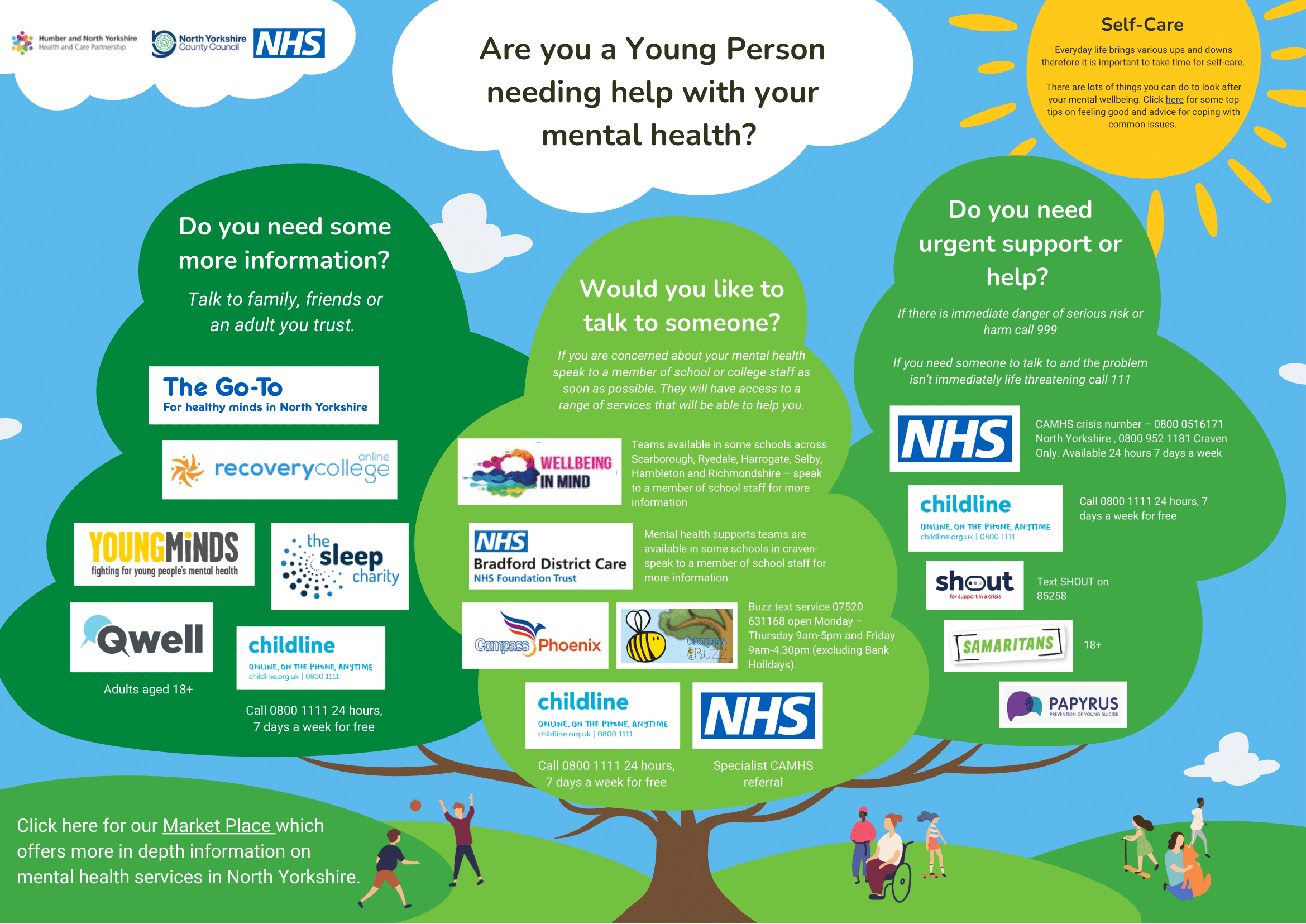
Safeguarding Support for Parents
https://www.safeguardingchildren.co.uk/parents-carers/
https://www.beateatingdisorders.org.uk/
https://www.nspcc.org.uk/keeping-children-safe/support-for-parents/
https://www.thinkuknow.co.uk/parents/
https://www.nhs.uk/healthier-families/
Anti Bullying
At RMS we do not tolerate bullying. We use the National Anti Bullying Awareness week’s to highlight our anti bulling stance however it is omnipresent through our behavioural policy and in every conversation where we are “Ready, Mutually Respectful and Safe” and we always “do all the good we can” at every opportunity. We teach our RMS family:
- the definition of respect and acceptable behaviour choices.
- that bullying is an unacceptable behaviour choice.
- that we all need to choose to respect each other both face to face and online to keep ourselves and others safe.
- where to find help when we find behaviour unacceptable.
We hope this work enables us to continue to learn and grow as members of the school and wider community.
https://anti-bullyingalliance.org.uk/tools-information/advice-and-support/advice-parents-and-carers
Physical Education
Intent
At Richmond Methodist, we believe that PE is ‘for all‘, a vital part of school life and ultimately our children’s well-being, both present and future. It is therefore our intent to provide an inclusive, broad and balanced PE curriculum that ensures all children will benefit, whether through developing existing skills, learning new skills or being introduced to new sports, clubs, teams and organisations.
It is our intent to ensure that our children understand the importance of leading a healthy lifestyle and to equip them with the tools to do so through health and well-being education. In addition, it is our intent to use physical education as a vehicle to ‘do all the good we can’. This is through developing communication and leadership skills within lessons, through our ‘Sports representative’, ‘House Captains’ and ‘playground leader’ groups. Children will be taught how to cooperate and collaborate with others as well as teach them understanding of fairness and equality.
We believe that participation in sporting activity is a key element of developing a school in which pupils are proud of the community in which they belong. Therefore, great emphasis is placed upon additional sporting opportunities beyond the lesson within lunchtime and after-school clubs, intra and inter-school competition and festivals as well as directly trying to support the local clubs within the Richmond area and our feeder schools. Our aim is to provide our children with a life-long love of sport and physical activity and to guide them to pursue their interests outside of school. We believe this links directly with our school ethos of ‘doing all the good we can’ and is another way in which we can positively engage with our local community and be active citizens within it.
Implementation
We will develop our children’s competence to excel in a broad range of physical activities. They will be physically active for sustained periods of time, throughout the school day as part of our ‘Teach Active’ lessons and timetabled ‘active breaks’. Our children will engage in competitive sports and activities and through our P.E. and also wider P.S.H.E. curriculum, lead healthy, active lives.
The children will receive physical education through exploring their physical environment and developing their locomotor, non-locomotor and manipulative skill and knowledge through a range of contexts within a year. The emphasis is put upon exploration and creative co-ordination in movement. PE is broadly divided into four strands:
Games –which include knowledge of ball skills and ball games in Key Stage 1, and in Key Stage 2 football, rugby, netball, hockey, dodgeball, cricket, basketball, golf, tennis and rounders.
Gymnastics – involves developing the pupils’ knowledge skills on the floor and on different apparatus.
Dance – a variety of themes are taught, some linking with other subjects, others taught as discrete dance projects.
Outdoor and Adventurous Activities – this element of the curriculum is largely covered by two residential visits that take place in Years 4 and 6 but is also included within our outdoor learning lesson and as part of the Key Stage 2 curriculum.
In Key Stage 1 and 2 athletics is taught. There are opportunities for extra-curricular teaching in football, netball, dodgeball, multi-skill, golf, hockey, cricket, tennis, tag-rugby and basketball. In years 3 /4 swimming is taught. It is also available to those children in Year 5 and 6 who have not achieved the end-of-Key-Stage-2 swimming standards. Parents should note that there is a request for a voluntary donation to cover the cost of pool fees and transport. However, no child is excluded on grounds of cost.
Throughout the year, we aim to provide a number of taster session to allow pupils to experience different sports, such as Judo. Again, we hope to give children experiences that will inspire them to pursue their sporting interests outside of school and throughout their childhood and beyond.
Impact
‘All’ of our children will have received a high-quality physical education curriculum that will have inspired them to succeed and excel in competitive sport and other physically demanding activities. ‘All’ children will have had opportunities to become physically confident, supporting their mental and physical health, both now and for the future through ‘doing all the good they can’ in sport. Through the P.E. curriculum, our children learn first-hand why fairness is so important and ‘all’ are valued. They also understand how our school vision of being ‘Ready, Mutually respectful and Safe’ will stand them in good stead to succeed and excel, be strong and resilient through life’s journey.
Religious Education
Please click here to view the Two year curriculum overview for R.E
Religious Education
Intent
In line with our Methodist character, we welcome all to our school and our Religious Education curriculum is ‘for all’.
We aim to
…engage all children in systematic enquiry into significant human questions which religions and world views address, so that they can develop the understanding and skills needed to appreciate and appraise varied responses these questions, as well as develop responses of their own.
(Taken from the North Yorkshire Agreed Syllabus for Religious Education 2024-2029)
Our Religious Education gives us the opportunity to reflect on ways of living where we can ‘do all the good we can’, developing our individual ideas, values and identities. We use the teaching of religious and non-religious world views to inform our knowledge so as to better understand the influences on ourselves and our communities.
We enable children to have the necessary knowledge, constructed systematically to consider the different answers to the challenging questions about the meaning and purpose in life, beliefs about God, ultimate reality, issues of right and wrong and what it means to be human.
Our curriculum enables all children to know about and understand a range of religious and non-religious world views. Our children will be able to describe, explain and analyse beliefs and practices, recognising the diversity which exists within and between communities and amongst individuals. They will be able to identify, investigate and respond to questions posed, and responses offered, by some of the messages found in religious and non-religious world views. Our children will appreciate and appraise the nature, significance and impact of different ways of life and explore ways of expressing meaning.
We want our children to be able to express their ideas and insights about the nature, significance and impact of religious and non-religious world views. They should be able to explain, using reasoned arguments, their ideas about how beliefs, practices and forms of expression influence individuals and communities. Children will be able to express with increasing reasoning their personal reflections and critical responses to questions and teachings about identity, diversity, meaning and value, including ethical issues. They should be able to appreciate and appraise varied dimensions of religion.
We aim for children to gain and deploy the skills needed to engage seriously with religious and non-religious world views. We want them to investigate key concepts and questions of belonging, meaning, purpose and truth, responding creatively. Children will enquire into what enables different individuals and communities to live together respectfully for the well-being of all. They will articulate clearly beliefs, values and commitments in order to explain why they may be important in their own and other people’s lives.
This understanding builds and connects us ‘all’ in a shared cultural capital, increasing respect and celebrating the diversity of ‘all’.
Implementation
We focus not only on the substantive knowledge, but ways of knowing and understanding the perspective or personal view of each of us. We recognise too that there is diversity within each world view and so when we teach substantive knowledge, we seek to widen so there is not a lens of generalisation for each world view, religious or non-religious, organised or individual.
We teach R.E. weekly and discretely through a mixture of practical and academic exercises. We use foundational texts, beliefs, rituals, and practices and explore how these aspects help us form identity in a range of religions and worldviews. We learn change in different times, places and cultures. Children are taught R.E. as a theological, sociological study of religious phenomena but also we recognise it is cross curricular and we will teach some aspects, for example philosophy and existentialism in our human and social sciences. We also encourage children’s creative responses to the development of their personal worldview.
Our R.E. substantive knowledge is underpinned by the following:
Spiritual development
We foster awe and wonder, making time to be mindful, reflective and in the moment. Our children are given opportunities to appreciate the possibilities of there being something or someone beyond ourselves, which religious World Views name as God/Gods but could be Mother Nature or the Universe for instance. We offer opportunities for children to reflect on their own ideas and how they may be informed, as well as the view of others. We ask big, critical questions and foster a natural curiosity towards things that are important to us. Children will work together, collaborating and investigating, agreeing, building on or challenging their ideas. We teach that our shared values construct a shared spirituality. With examples of fairness and respect, compassion and generosity, we inspire each other but also tenacity and service, education and perseverance will be explored in real contexts. Above all, children will be encouraged to appreciate and to notice by exploring some of the marvels and mysteries of the natural world, of human ingenuity, and examples of the capacity of humans to love, create, organise and overcome adversity.
Moral development
The development of strong values, both individual and shared enables children to appreciate the uniqueness of all humans and their moral value, and to act in the world and to others accordingly.
Teamwork, trust and empathy will be taught and nurtured. Moral questions will be posed to allow a safe space for children to explore their ideas of right and wrong, moral dilemmas and explore case studies where the Christian values are practiced. Moral connections with others will be established through role play, debates or whole school projects, however, in situations where there are disagreements will also be explored so children learn that their right of expression is balanced by a responsibility to listen to the views of others. We respect the rule of law.
Social development
We use a range of language and communication skills. We all have a voice. We participate in the local community. We appreciate diverse viewpoints. We participate, volunteer and cooperate. We empathise to develop strategies to resolve conflict and learn the value of democracy. We strive towards understanding and so we promote peace and harmony. We explore the more abstract concepts which bind our communities together, such as justice, fairness, honesty and truth. We investigate sources of thought, belief and ideas to better understand social and behavioural norms. We examine the media and political or social issues which may change behaviours. We find appropriate role models, locally, nationally and internationally to inform our behaviours and relationships. We go on school trips, invite visitors in and use drama or art to experience different representations.
Cultural development
We appreciate our shared culture and explore fully our together heritage. Our History is an important part of our present and future. We look for links, causes and effects. We learn about other World Views, celebrating both similarities and differences. We celebrate diversity whilst cherishing community. Together, we share in as many cultural opportunities as possible.
We teach our R.E. through an enquiry approach where we ask questions to increase our knowledge and make connections between themes and perspectives. We use challenging questions of meaning and purpose raised by human existence and experience.
As a Church School, we teach a rich, deep knowledge and understanding of Christian belief and practice, and this includes the ways in which it is unique and diverse.
Our Christian concept blocks are sequential, progressing across a year and vertically through the school.

- We make sense of a religious text, piece of art or music: developing pupils’ skills of interpretation; understanding how Christians interpret, handle and use biblical texts and other resources; making sense of the meanings of these aspects for Christians.
- We Understand the impact: examining ways in which Christians respond to biblical texts and teachings, and how they put their beliefs into action in diverse ways within the Christian community and in the world.
- We connections: evaluating, reflecting on and connecting the texts and concepts studied, and discerning possible connections between these and pupils’ own lives and ways of understanding the world.
Impact
Through our Religious Education and our SMSC learning, we aim to improve academic standards but also create an equality of opportunity ‘for all’ and maximize our children’s life chances.
We build a cohesive, harmonious community ‘for all’ through a well-rounded understanding of, and respect for, both self and for others.
Our children leave KS2 able to look back on a secure, engaging and happy primary education and can be proud of their successes. They are able communicators, responsible citizens and resilient life-long learners. We want them to be confident that they have always done ‘all the good they can’ and will continue to do so.
They will have made and be good friends, making friendships that will endure. The children will be able to encourage others – when necessary and have leadership skills, but above all, be interested in the world around them and keen to make a positive contribution to society. We hope that they will be willing to share and reflect upon their own and other’s perspectives and thoughts, be able to work with others, without prejudice, understand changes and be eager for challenge. They will see the wonderful world as ‘for all’ and will have the secure foundations to begin to understand their place in it.
We will see evidence of the success of our curriculum, not only through our monitoring but through the personal development of our children. It will be evident in their relationships, their behaviours and their sense of civic responsibility.
During their time in school children take part in acts of collective worship.
It should be noted that parents have the right to withdraw their children from RE teaching and should contact the headteacher should they wish to do so.
Remote Education Provision
What is expected?
This information is intended to provide clarity and transparency to staff, pupils, parents or carers and Governors about what to expect from remote education where national or local restrictions require entire cohorts (or bubbles) to remain at home, which also applies where individuals need to isolate. Richmond Methodist Nursery and Primary School has the capacity to offer immediate remote education ‘for all’.
Remote education in Richmond Methodist Primary and Nursery School consists of high-quality, sequential live and recorded teaching and learning via Microsoft Teams, making flexible use possible in the context of limited or shared device access. We will continue to teach all or most of the normal planned curriculum in the remote environment, which remains underpinned by our vision of ‘doing all the good we can’. However, we have needed to make some adaptations in some subjects. For example, more practical subjects like art, design technology, computing, music and science. Knowledge and skills are built incrementally, with clarity about what is intended to be taught and practised in each subject. It will allow for daily meaningful interaction between adults and children, which provides not only ambitious learning but also effective assessment and feedback.
Our remote, restorative, and responsive curriculum will cover a broad and balanced range of subjects, providing frequent clear explanations of new content, delivered by a teacher in the school. Our programme of remote learning will build up to the equivalent length to the core teaching pupils would receive in school – three hours for EYFS and KS1 and four hours for KS2 – and include daily contact with teachers. Teaching will be differentiated and provide both support and challenge as appropriate, to meet the needs of all children.
Younger children and some children with SEND (Special Educational Needs and Disabilities) may not be able to access remote education without adult support so school will adapt teaching and learning materials accordingly to meet individual needs.
Our plan for remote education has been devised in consultation with staff and parents. We have evaluated what aspects of remote education went well in 2020 and we need to keep, what aspects to stop, what aspects we need to improve and what aspects we need to start delivering that we were not able to deliver last year.
A large part of our recovery curriculum will be supporting children, families, and staff in delivering, managing, and using high-quality, sequential remote learning via Teams. We will:
- share remote learning expectations with staff, parents and Governors.
- ensure all staff are trained and feel confident using Teams.
- support children and families to access remote education.
- loan school iPads and laptops for those families with limited access to devices or families with multiple siblings who are sharing devices.
- supply printed resources and workbooks, for pupils who do not have suitable online access or for our younger children or SEND pupils who may require different and additional resources.
- establish ‘Remote Learning Behaviour Expectations’ around being ‘Ready, Mutually Respectful and Safe’, including expectations around being respectful, using mute, using camera, use of chat.
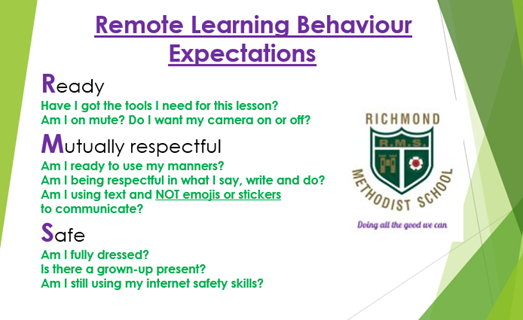
- Class Dojo and Tapestry will remain in use for communication, as our parents welcome this, and the communication element has already proved to be invaluable in summer term 2020. Teachers and parents will be able to message one another to share information and offer support. The Class Story page will offer the chance for teachers to celebrate children’s work and maintain our school community. Use of Class Dojo and Tapestry will be in-line with the Class Dojo and Tapestry Usage Policies.
- For children in Years 1 – 6, Teams will be for teaching and interaction and Class Dojo will only be used for sharing some resources/worksheets, communication and celebrating success. For children in Nursery and Reception, Teams will be used for teaching and interaction and Tapestry for observations, assessment, and messaging. We will continue to use Dojo and Tapestry in school when not in lockdown.
What Remote Learning will look like at RMS?
- Staff will set up a weekly timetable from September 2020– with a learning objective for each lesson. Teachers will differentiate the tasks into bronze, silver, and gold challenges. These will be sent home weekly so that parents are aware of the sequence of learning.
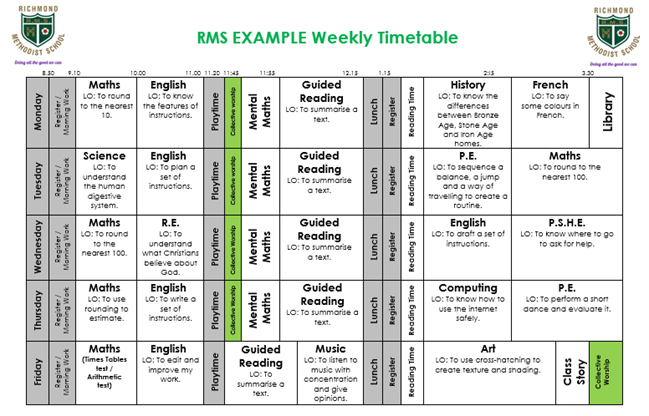
- All live lessons will be recorded to provide flexible access for families. MS Teams will support school in offering true online learning with the opportunity for children to communicate with staff – often in the form of ‘drop-in’ and feedback sessions following live teaching.
- Richmond Methodist Primary and Nursery School will provide daily live English and maths unput and ‘drop-in’ sessions – with short input from the teacher and then a period of supervision and opportunities for support, challenge and feedback. Sessions can be differentiated eg. L, M, H. One staff member from each team can lead a differentiated input or session inputs can also be whole class. White Rose Maths resources will be used, as they are matched to our current maths curriculum model.
- We will deliver daily phonics activities in N/R/Y1/Y2 (Y3 if required) – Differentiated sessions for each phase can be taught, using breakout rooms. These sessions should involve direct teaching of new sounds, to ensure accuracy of phoneme pronunciation and grapheme formation. Trained and skilled support staff can deliver phonics sessions.
- Weekly live whole class reading and guided reading sessions will take place for each child in line with our RMS Reading Blueprint. 1:1 reading for vulnerable children / our lowest 20% and reading interventions can all take place remotely. All staff will be involved in leading guided reading sessions and individual 1:1 reading (using breakout rooms). Children will have access to the Big Cat eBook Library, which matches our Guided Reading scheme in school. Staff will allocate eBooks at the correct level for children to read them at home.
- We will deliver a broad and balanced curriculum which does not over-rely on long-term projects and on-line research. Foundation subjects (and science) will be taught weekly with one live input daily. Eg. Monday – Science, Tuesday – History, Wednesday – Art/DT. This will include live teaching then period of supervision for feedback/questions. We will deliver two sessions of PE and encourage daily activity – which can include on-line sessions. KS1 (and EYFS) will offer a home accessible continuous provision model (e.g. Rainbow Challenges KS1). These will be independent learning challenges the children can flexibly complete in non-directed time during the school day.
- We will gauge how well pupils are progressing through the curriculum through questioning and providing feedback, checking work throughout the daily live teaching session. We will ask parents to share high quality photographs of work. These can be ‘liked‘ to demonstrate they have been seen rather than a comment written, unless teachers feel this is necessary. When using work from home as an assessment, we will ensure we are aware of the level of adult scaffolding. We may ask parents to show the help they have given. The questions children ask in a Teams ‘chat’ can help gauge children’s understanding and additional support that may be required.
- We will support children’s positive mental health and wellbeing and allow for social interaction between peers through supervised Teams playtimes, supervised by support staff. Each class will be divided into four playtime groups – that include friendship groups. Support staff may, if necessary, provide a smaller playtime group for vulnerable children.
- PSHCE will be core to our recovery curriculum to promote positive mental health and wellbeing. We will ensure that there is regular, direct teaching of PSHCE with opportunities to follow the planned curriculum AND in response to the social and emotional needs of children.
- Mental and physical wellbeing is a priority for our whole school community. As such, school staff will plan to break up lessons and ‘screen time’ by encouraging physical activity and breaks between lessons. Staff could provide links to online physical activity/mindfulness eg. Joe Wicks, Cosmic Yoga.
- Collective Worship will take place twice weekly via Teams – 11am on Mondays and Fridays. Fridays CW will be our Celebration Assembly. Rachel Pinkney will also record one assembly per week to be shared by the class teacher.
- We will plan for and teach internet safety in week one of every half term and revisit regularly.
- Staff will monitor pupil engagement via Teams and work submitted on Class Dojo/Tapestry and contact families to provide additional support if required. Staff should monitor engagement overtime by completing a register or downloading a list from participants.
- RMS has taken steps to build safeguarding into our remote education set-up. Chat and email functions have been disabled in Teams for all children. Parents have signed a Teams user agreement and behaviour expectations will be embedded into remote learning activities. Our usual safeguarding policy and method of reporting on CPOMS applies at all times.
- On a weekly basis we will record the percentage of engagement in live learning and the percentage of engagement by returning completed work for each year group. Senior leaders will monitor engagement over time.
- Richmond Methodist School expect regular engagement in remote learning and if class teachers have not had any engagement during a school week (either in live learning or by returning work), then they will contact parents via Class Dojo, then via a phone call home to check-in and provide further support for remote learning. Staff will use CPOMS to report concerns if there has been no engagement for one week.
- Our SENCO will check in with our vulnerable families weekly and support engagement and the Headteacher will contact families whose engagement is a cause for concern via phone call or doorstep visit.
- Our SENCO will contact Children’s Social Workers and Early Help team at the start of a period of local or national lockdown (or when a vulnerable child needs to isolate) to discuss the support provided by the school and agree a risk assessment.
- PPA (Planning Preparation and Assessment) can be done remotely and will take place on Wednesday pm for Year 3 / 4, Thursday pm for Year 5 / 6 and Friday for Year 1 / 2 and EYFS (Early Years Foundation Stage).
- SLT meetings will take place remotely, Wednesdays 4.30pm – 5.30pm.
- Staff meetings will take place remotely, Tuesdays 4.30pm – 5.30pm.
- Meetings will only take place when required for urgent and essential business and staff will be encouraged to attend these virtually at home.
- School will direct parents to Oak Academy for daily learning activities, in the event that a class teacher is unable to plan and deliver remote education.
- If children or parents themselves are too ill, then they should let their child’s class teacher know and there will be no expectation to engage in remote learning.
Feedback During Remote Learning:
- Our techniques for feedback during periods of “remote learning” align with our in-class practices.
- Teaching staff give whole-class verbal feedback during live lessons on Teams. They give feedback to groups or individuals by using breakout rooms.
- Teachers gauge how well all pupils are progressing through questioning.
- Teachers give feedback and assess progress daily.
- Children’s work will be uploaded by parents onto their child’s Class Dojo and Tapestry portfolio to be monitored and approved by the teacher. This will inform teachers of next steps in learning.
- For children unable to access live feedback, teachers can communicate with them using Class Dojo, Tapestry or via a phone call.
Supplementary Work:
- Children with Lexia log in do this daily and staff can monitor progress.
- Set a weekly sum dog task for all children in Y1 – Y6.
- All children have a Big Cat eBook Library login, enabling them to read books at their level from home.
- Children and parents will be signposted to the ESafety page on our school website. Children will be encouraged and reminded regularly how to stay safe online.
- Continuous provision challenges for children in the Early Years and Key Stage 1 (Rainbow Challenges).
Logistics for Critical Worker and Vulnerable Learner Bubbles in school:
- Our CW/V bubbles will be taught and staffed by teaching and support staff combinations who usually teach in those age ranges to minimise close contacts in line with our Risk Assessment.
- Teaching staff will focus on leading on-line learning, assessment, and feedback for all children, including critical worker/vulnerable children. Support staff will lead sessions and support smaller groups/individuals with engagements and closing the gap activities.
Our approach to remote learning will follow the current school timetable but may be adjusted (and continually reflected on) to safeguard staff and children’s physical and mental well-being over time.
KS1
8.40 -11.30 Core Subjects including movement breaks
11.30-12.30 lunch
12.30 Short input followed by Foundation Subject Rainbow Challenges
(No expectation for staff for staff to be available online)
2.30- 3.00 End of day activity (e.g., story, sharing time)
KS2
9,00/9.15 -12.30 Core subjects including movement breaks
12.30-1.30 lunch
1.30- Foundation Subject (inc. Science) Input followed by Independent Learning Challenges. There is no expectation for staff to be available on-line.
3.00 – 3.30 End of day activities for children in school and at home (story/circle time / sharing work)
Appendix 1
From 8th January 2021 the Department for Education’s expectations are that schools:
- set assignments so that pupils have meaningful and ambitious work each day in a number of different subjects
- set work that is of equivalent length to the core teaching pupils would receive in school, and as a minimum
- EYFS and KS! 3 hours a day, on average, across the school cohort
- KS2: 4 hours a day across the cohort
- provide frequent, clear explanations of new content, delivered by a teacher or through high-quality curriculum resources or videos
- have systems for checking, at least weekly, whether pupils are engaging with their work, and inform parents immediately where engagement is a concern
- gauge how well pupils are progressing through the curriculum using questions and other suitable tasks, and provide feedback, at least weekly, using digitally facilitated or whole-class feedback where appropriate
- enable teachers to adjust the pace or difficulty of what is being taught in response to questions or assessments, including, where necessary, revising material or simplifying explanations to ensure pupils’ understanding
Reading
Intent – Reading curriculum aims
At RMS, we place reading at the heart of everything we do because is the foundation for all learning. Our reading curriculum develops our children’s ability to read fluently and understand what they are reading. Through reading in particular, our children have opportunities to develop culturally, emotionally, intellectually, socially and spiritually.
The National Curriculum for English (2014) aims to ensure that all pupils:
- Read easily, fluently and with good understanding
- Develop the habit of reading widely and often, for both pleasure and information
- Acquire a wide vocabulary, an understanding of grammar and knowledge of linguistic conventions for reading, writing and spoken language
- Appreciate our rich and varied literary heritage
We foster an appreciation and love of books and reading at every opportunity, including through:
- Sharing high-quality books with the children
- Weekly school library slots for each class
- Reading for pleasure opportunities in the school day
- Reading being a focal point in our ‘Learning Cycle’
- Author visits
- Celebrating World Book Day
- Investing in books and reading in our school
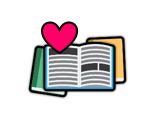
We encourage all children to read at home every day. We ask parents to record this in their child’s reading diary.
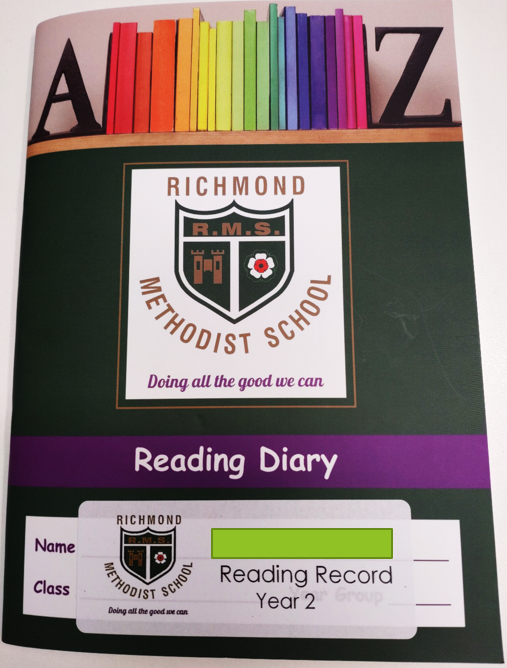
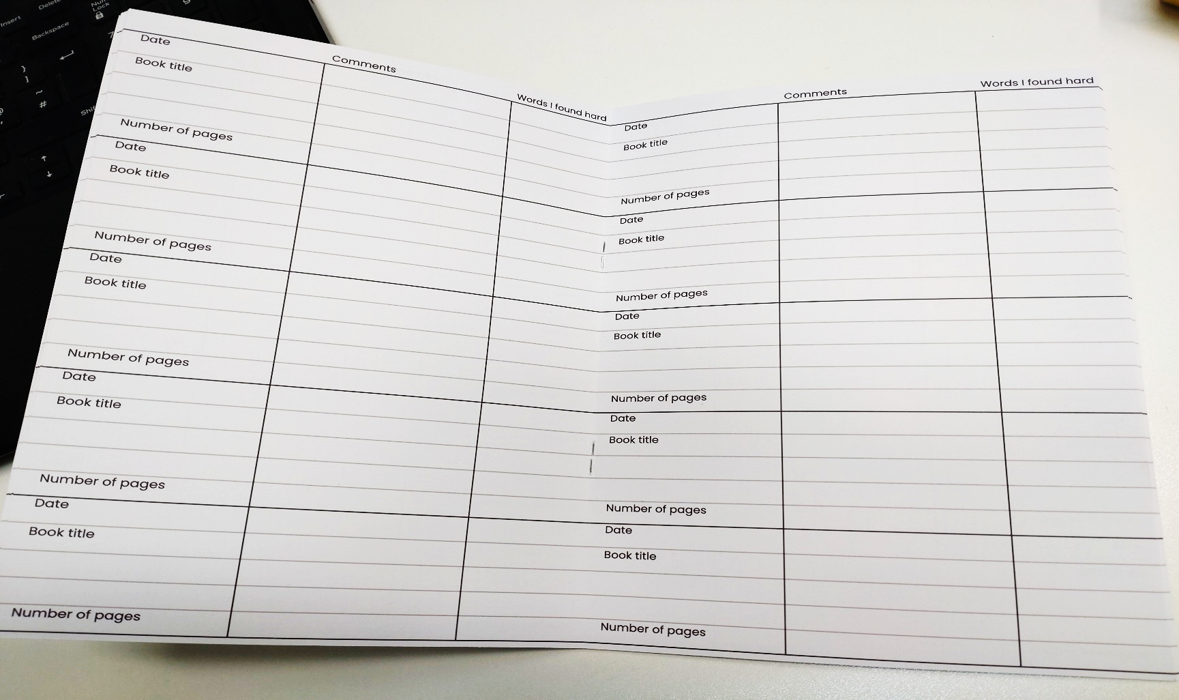
Implementation – How we teach reading
Reading in EYFS and KS1
At RMS , we believe that all our children can become fluent readers and writers. This is why we teach reading through Little Wandle Letters and Sounds Revised, which is a systematic and synthetic phonics programme. We start teaching phonics in Nursery/Reception and follow the Little Wandle Letters and Sounds Revised progression, which ensures children build on their growing knowledge of the alphabetic code, mastering phonics to read and spell as they move through school.
As a result, all our children are able to tackle any unfamiliar words as they read. At RMS, we also model the application of the alphabetic code through phonics in shared reading and writing, both inside and outside of the phonics lesson and across the curriculum. We have a strong focus on language development for our children because we know that speaking and listening are crucial skills for reading and writing in all subjects.
Daily phonics lessons in Reception and Year 1
- We teach phonics for 30 minutes a day. In Reception, we build from 10-minute lessons, with additional daily oral blending games, to the full-length lesson as quickly as possible. Each Friday, we review the week’s teaching to help children become fluent readers.
- Children make a strong start in Reception: teaching begins in Week 2 of the Autumn term.
- We follow the Little Wandle Letters and Sounds Revised expectations of progress:
- Children in Reception are taught to read and spell words using Phase 2 and 3 GPCs, and words with adjacent consonants (Phase 4) with fluency and accuracy.
- Children in Year 1 review Phases 3 and 4 and are taught to read and spell words using Phase 5 GPCs with fluency and accuracy.
Daily Keep-up lessons ensure every child learns to read
- Any child who needs additional practice has daily Keep-up support, taught by a fully trained adult. Keep-up lessons match the structure of class teaching, and use the same procedures, resources and mantras, but in smaller steps with more repetition, so that every child secures their learning.
- We timetable daily phonics lessons for any child in Year 2 and above who is not fully fluent at reading or has not passed the Phonics screening check. These children urgently need to catch up, so the gap between themselves and their peers does not widen. We use the Rapid Catch-up assessments to identify the gaps in their phonic knowledge and teach to these using the Rapid Catch-up resources – at pace.
- These short, sharp lessons last 15-20 minutes daily and have been designed to ensure children quickly catch up to age-related expectations in reading.
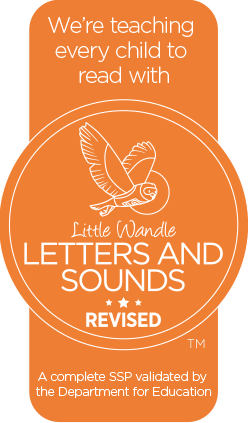
Our Reception, Year 1 and Year 2 children receive daily phonics lessons and take part in three reading practice sessions per week. The book they are reading is accurately matched to their current phonics knowledge.
The reading practice sessions have been designed to focus on three key reading skills:

- decoding = phonics
- prosody = reading with meaning, stress and intonation
- comprehension = understanding the text
After the third reading practice session, the child can read 95% of the words. It then goes home to be read for fluency practice.
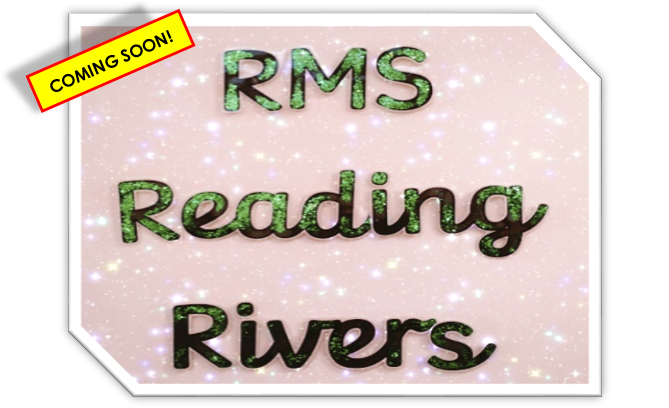
Supporting children in their journey to becoming a reader is one of the most important things we can all do. Ensuring that children become fluent, active readers allows them to make sense of the world around them, enables them to acquire new knowledge and encourages their imaginations to flourish! Reading is the key that unlocks the world of learning and that is why it is at the heart of everything we do here at RMS.

To replace our current reading scheme, we are excited to launch our exclusive
RMS Reading Rivers!
Each year group, from Reception to Year 6, has a selection of six high-quality books per half term to take home and enjoy. The aim is to read as many of the six books as they can.
Here is Swale’s Reading River for this half term, as an example:
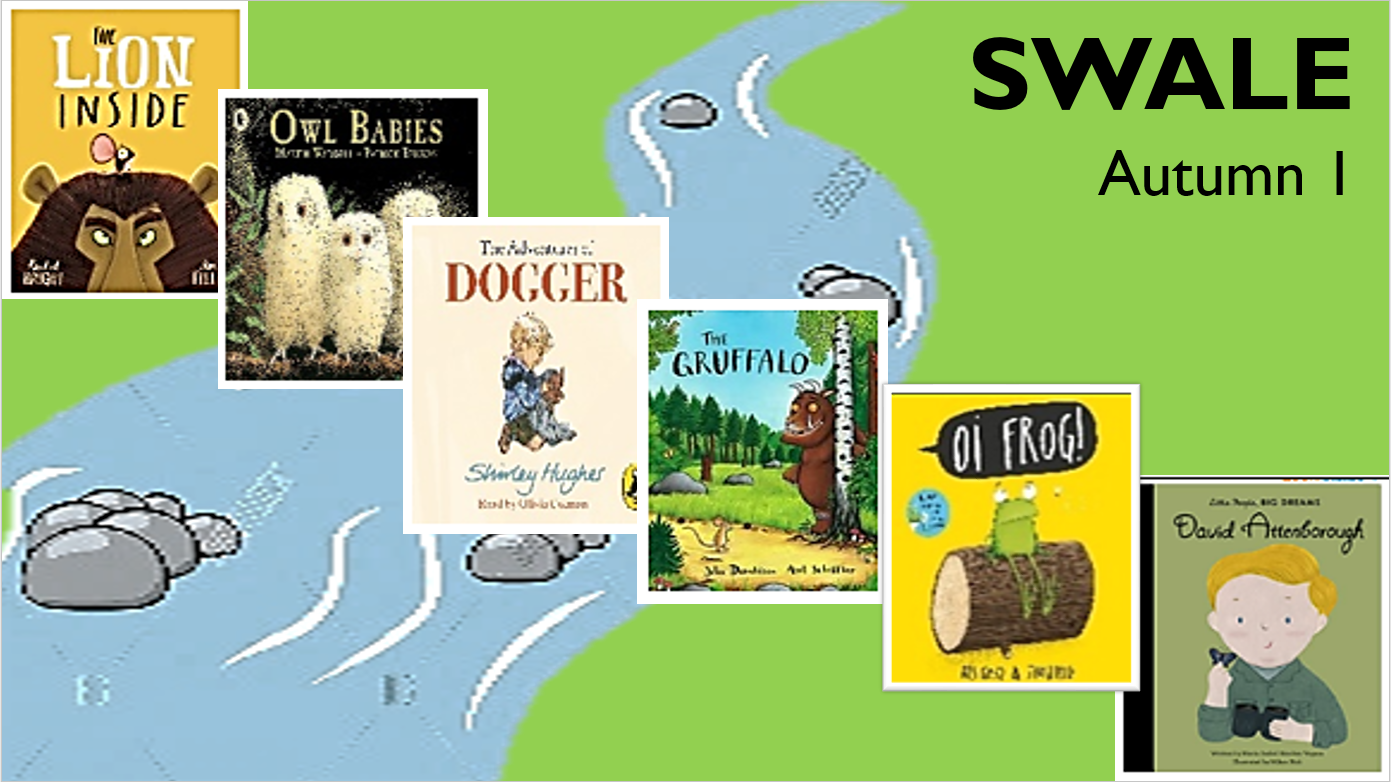
Each half term, six new books are on offer. We have collated some fantastic titles, carefully chosen for their diversity of characters, themes and authors. We have listened to parents, staff and pupil suggestions and have also included best-sellers, prize-winners and classics.
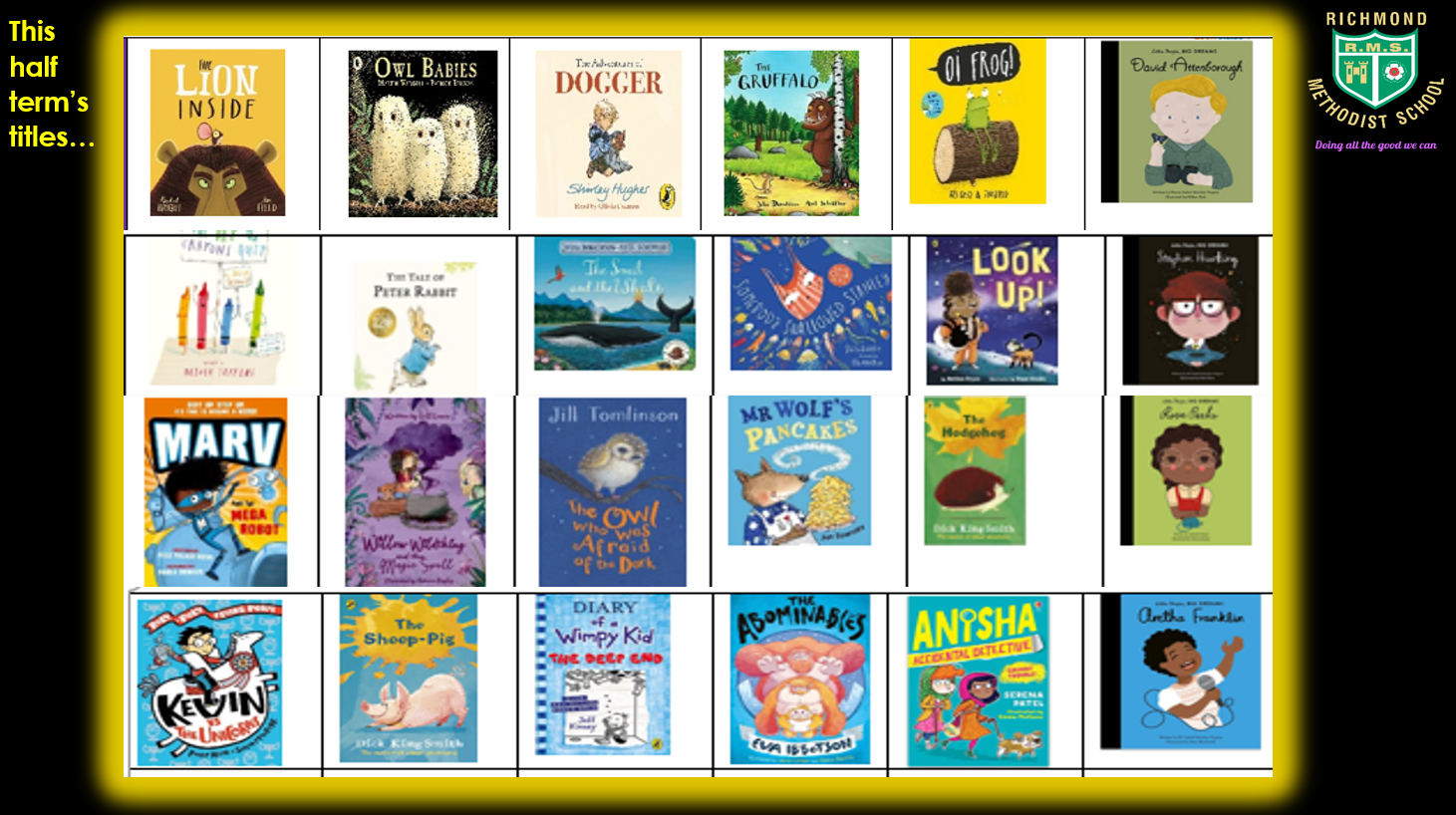
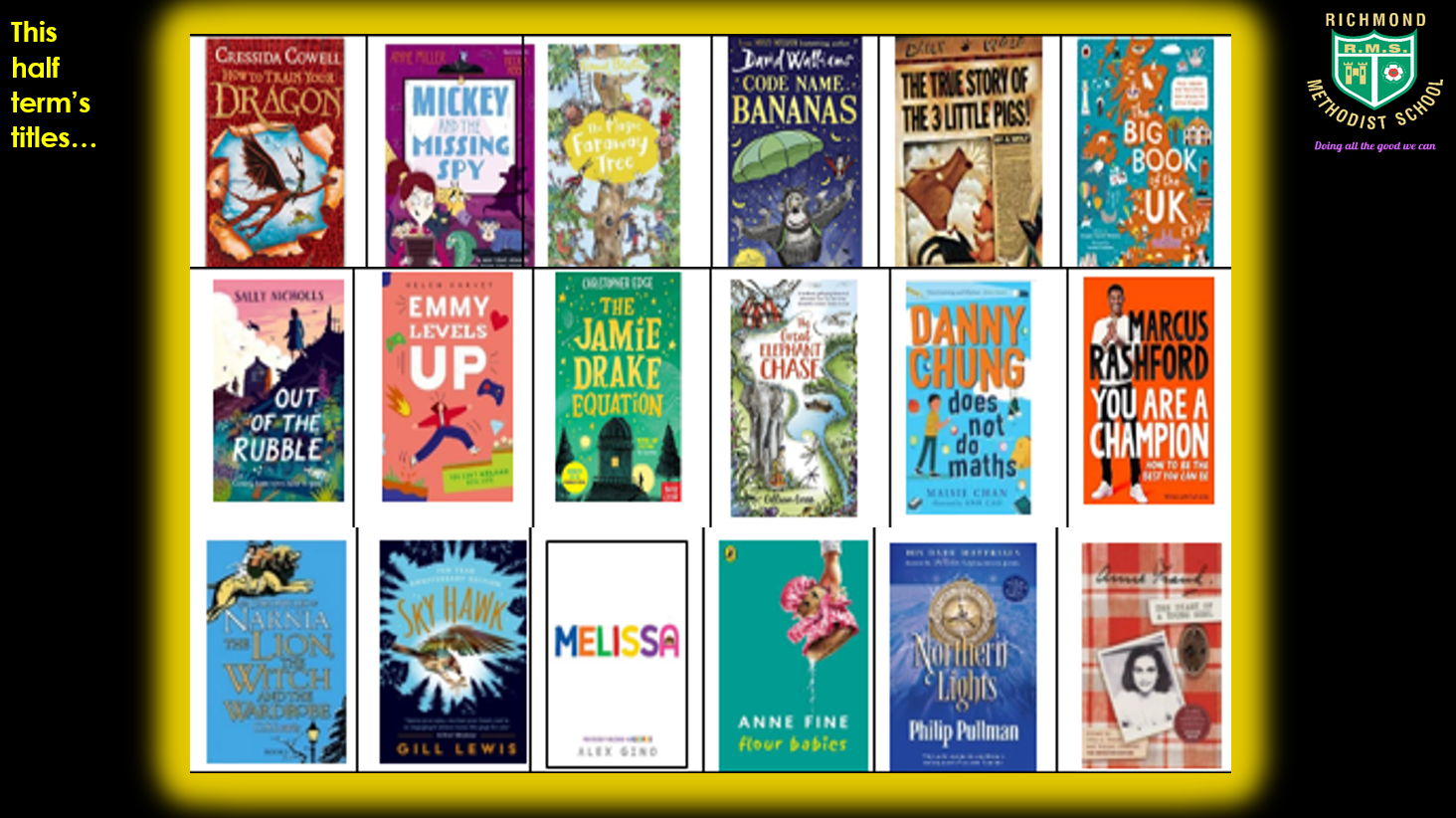
Each Reading River has been named after a river in the Yorkshire area, starting with ‘Swale’ right here in Richmond for Reception and ending with ‘Esk’ near Whitby for the Year 6s.
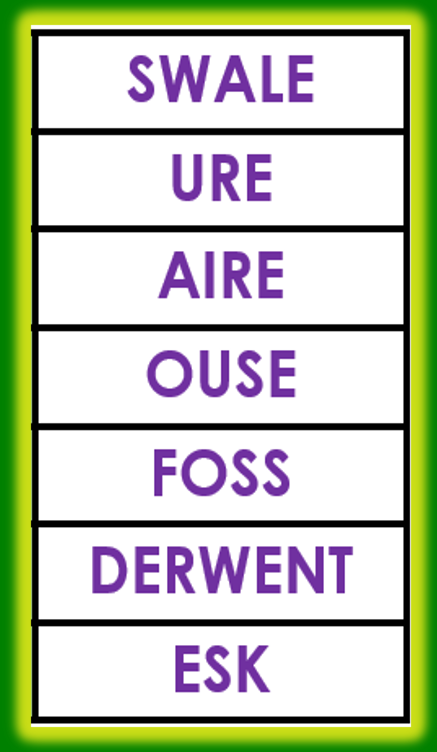
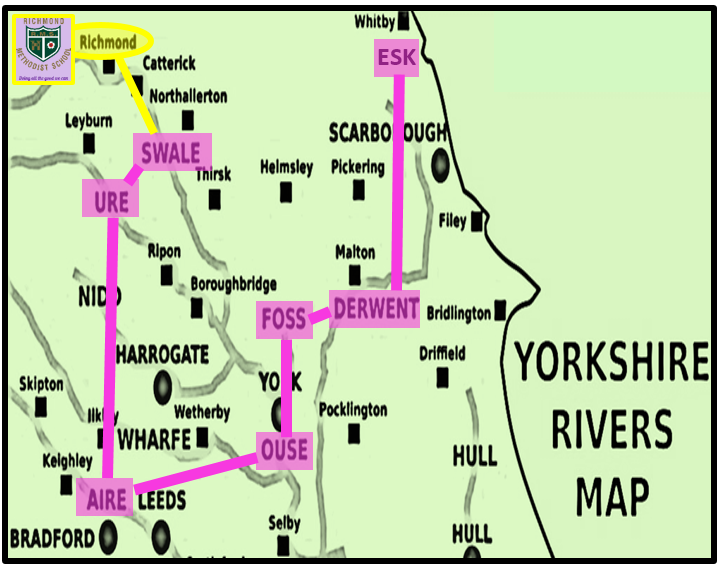
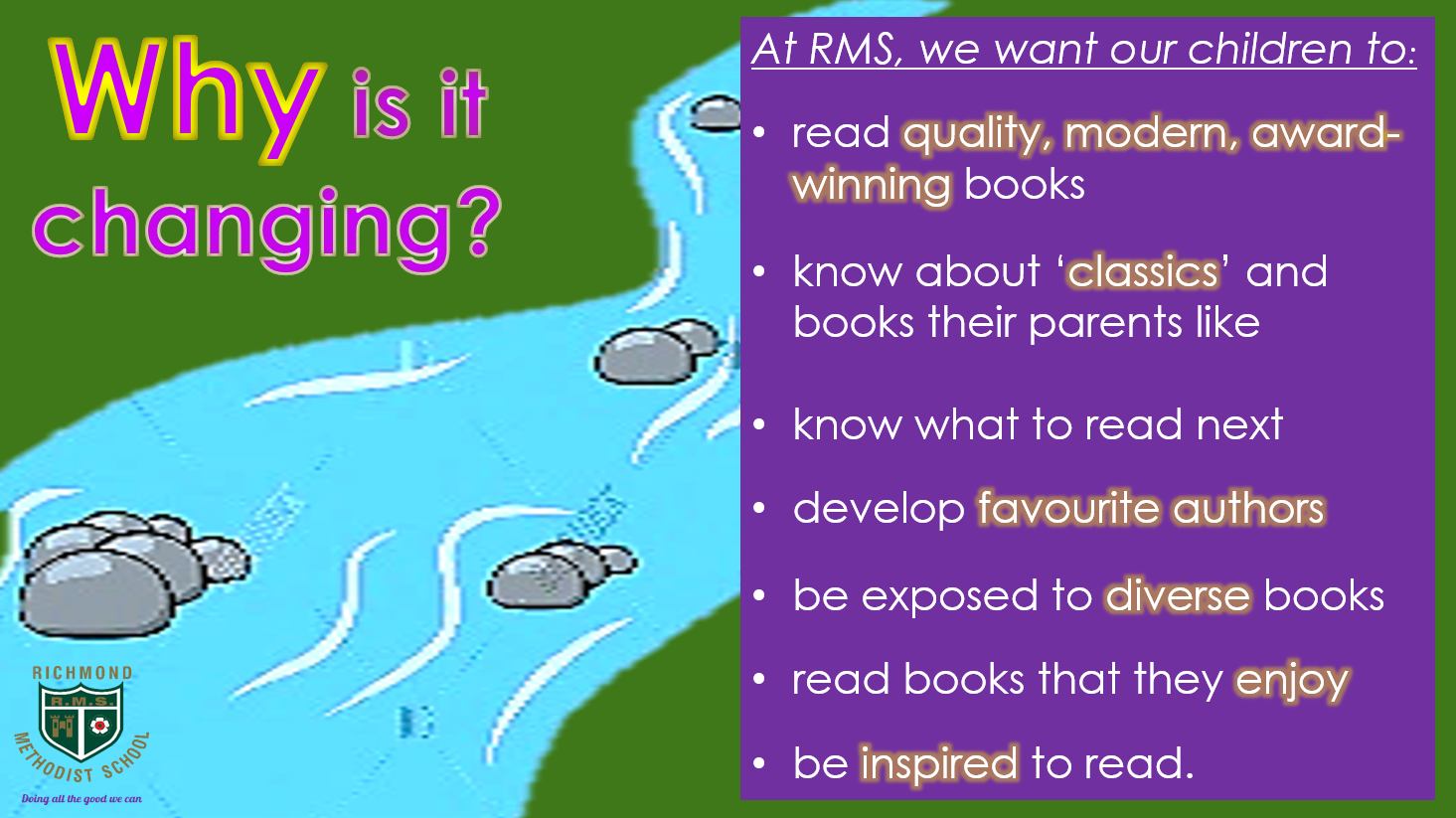
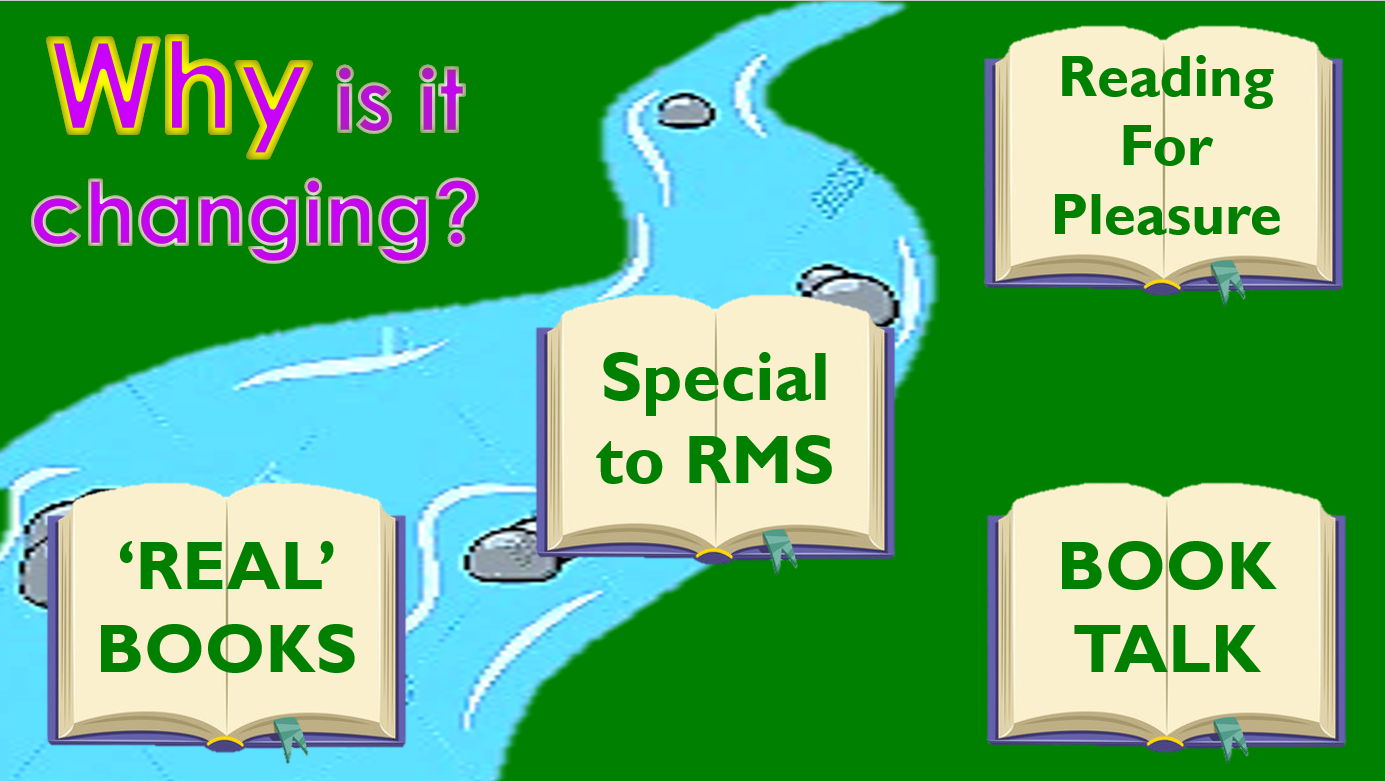
If your child is learning to read and has a Little Wandle phonics book, they will continue to bring the phonics book home to practise each week.
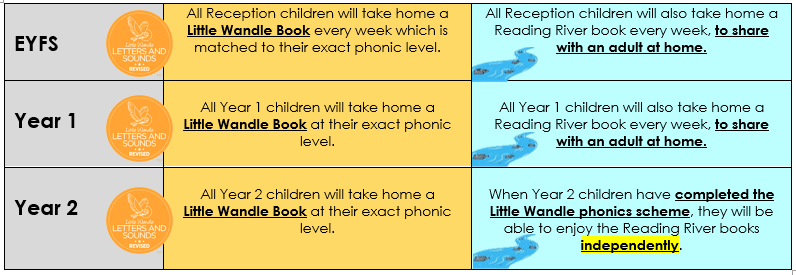
Their Reading River book is simply their ‘reading for pleasure’ book. If they cannot yet read it themselves, please read, share and explore the Reading River book with your child. For all other children, the Reading River book is their weekly reading book to read to an adult at home every day and enjoy!
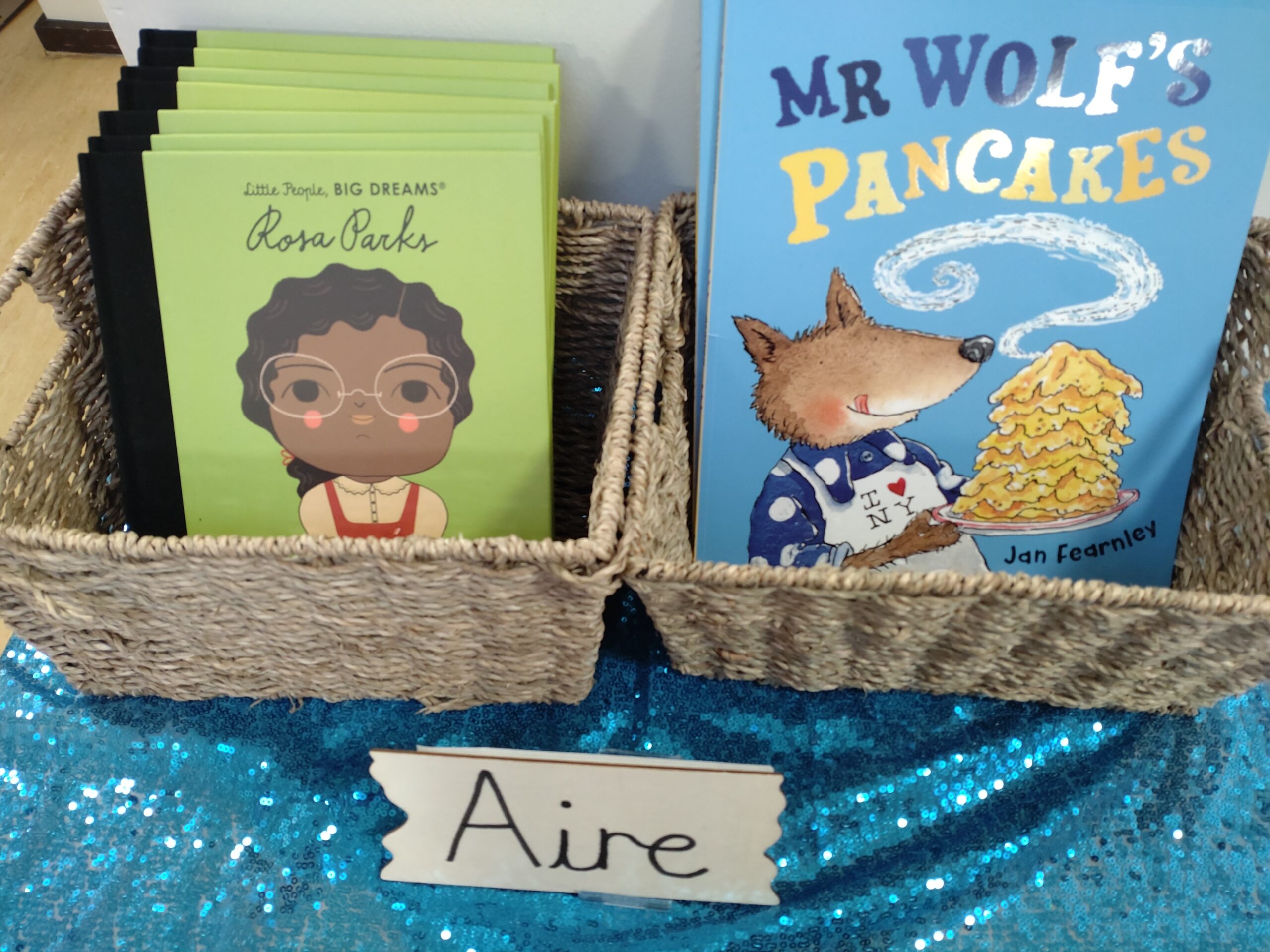
Lots of our brand new books have already started arriving!
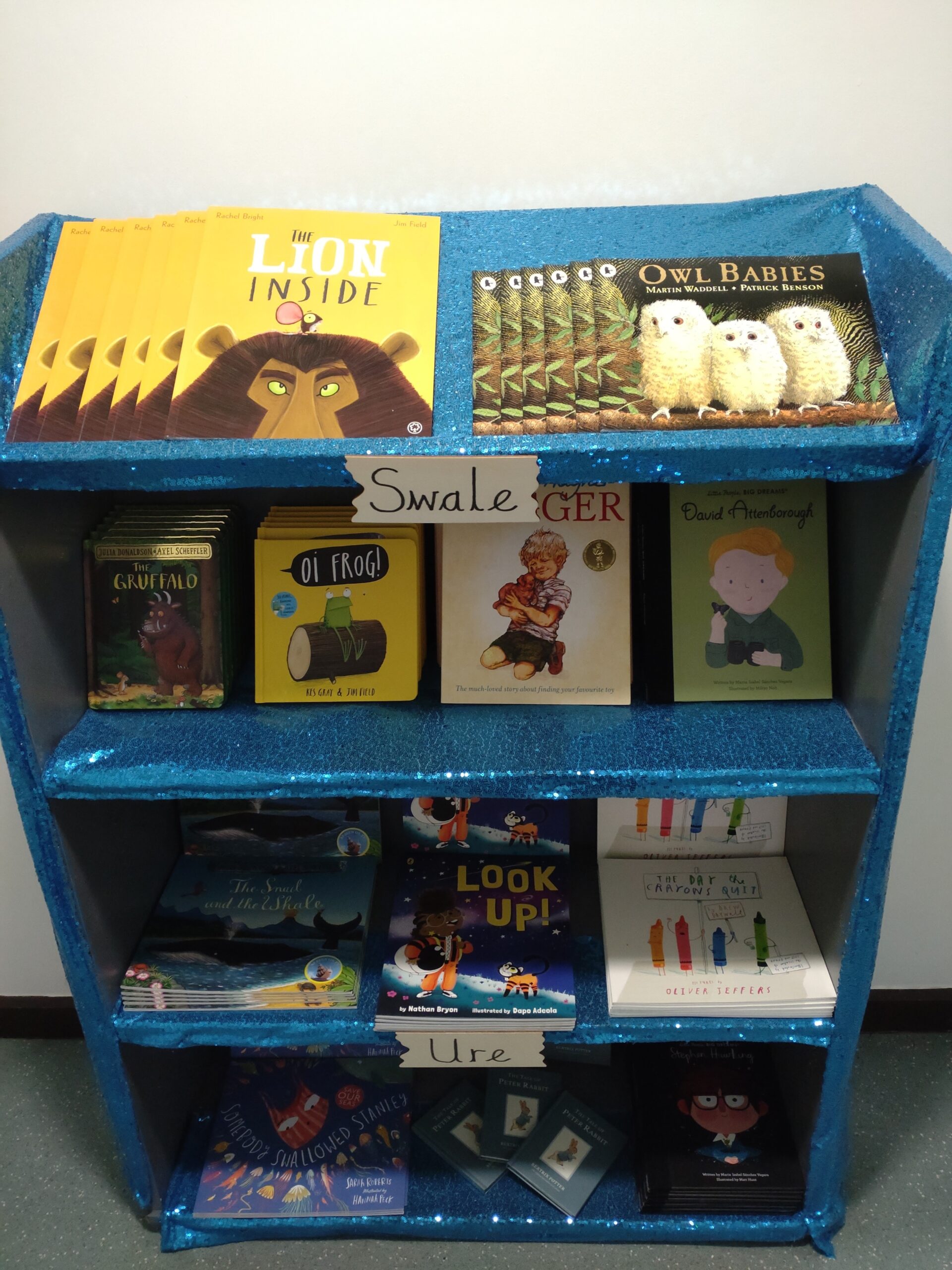
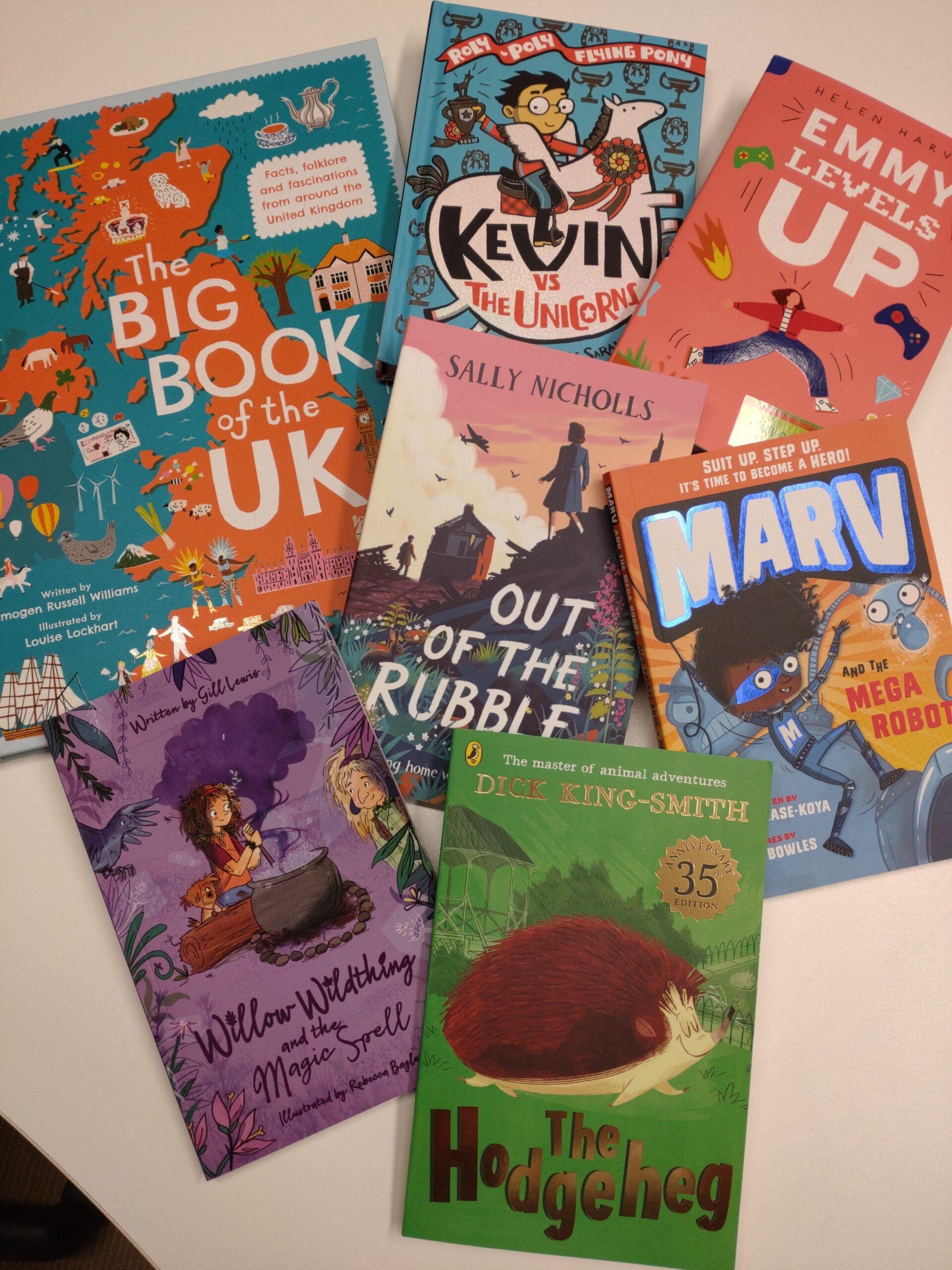
The children will be able to begin their journey down the Reading Rivers very soon!
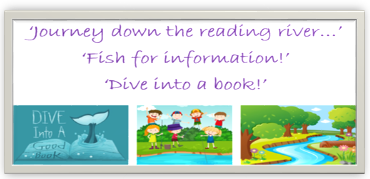
Reading in KS2:
In KS2, we teach reading through a whole-class guided reading approach, which consists of:
- Three 20-minute whole-class guided reading sessions (teacher and children read class book and discuss, question and develop skills)
- One 20-minute discrete comprehension per week
- Daily reading for pleasure sessions (children enjoy reading and teachers hear individual readers)
Reading continues to be developed to include higher order reading skills, where greater emphasis is placed on inference and deduction. Reading for understanding, skimming, scanning, summarising, making references or supporting a view are all important features of KS2 reading.
Impact – How does our children’s reading knowledge develop?
Our children progress from decoding to reading with automaticity and comprehension. Children in Year 6 read widely and often, for both pleasure and information.
Our lowest 20% of readers across the school become more fluent and not only progress academically but their confidence increases and attitude towards books and reading becomes a positive one.
Science
Intent
At RMS, we recognise the importance of Science in every aspect of daily life. Our Science curriculum is ‘for all’. We aim to ensure that ‘all’ of our children develop scientific knowledge and conceptual understanding through the specific disciplines of biology, chemistry and physics. Underpinning this will be a developing excitement, curiosity and awe of natural phenomena. Our children will develop understanding of the nature, processes and methods of science through different types of science enquiries that will help them to answer scientific questions about the world around them. We aim to ensure all of our children are equipped with the scientific knowledge required to understand the uses and implications of science, today and for the future. We are also aiming to ensure ‘all’ of our children have a secure foundation in their understanding of the world and are able to ‘do all the good they can’ to contribute to the world’s future prosperity.
Implementation
Children will develop a secure understanding of each key block of knowledge and concepts in order to progress to the next stage. Through scientific investigation, children will develop understanding through practical activity and be encouraged to develop critical and creative thought, correcting misconceptions as they learn. An important aspect of Science at RMS is for the children to learn and use technical terminology and extended specialist vocabulary, both while in discussion during practical investigation and also when writing up their findings. This will be modelled by the adult in the environment. Children will be encouraged to explain their reasoning and use discussion to clarify ideas. Our children will apply their mathematical knowledge to their understanding of science, including collecting, presenting and analysing data. When appropriate, cross curricular links will be sort to maximise children’s engagement. Working scientifically is embedded throughout the different contents so our children learn to use a variety approaches to answer relevant scientific questions. These types of scientific enquiry should include; observing over time; pattern seeking; identifying, classifying and grouping; comparative and fair testing (controlled investigations); and researching using secondary sources
Impact
Our Science curriculum fosters a healthy curiosity in our children about our universe and promotes respect ‘for all’, the living and non-living. We believe that science encompasses the acquisition of knowledge, concepts, skills and positive attitudes. Our children will also develop their spiritual self as they appreciate with awe and wonder the beauty and complexity of the natural world. The discipline of searching for answers based on evidence enables our children to ‘do all the good they can’, both during their time at school and also throughout their lives, as they understand the power of rational explanation. This understanding of the world will enable our children to explain what is occurring, predict how things will behave and analyse causes.
Please click here to view the Two year curriculum overview for Science
Writing
Intent – Writing curriculum aims
At RMS, our writing curriculum develops our children’s ability to write coherently and speak confidently. Effective written and spoken communication is key to our pupils’ personal growth.
The National Curriculum for English (2014) aims to ensure that all pupils:
- write clearly, accurately and coherently, adapting their language and style in and for a range of contexts, purposes and audiences
- be competent in the arts of speaking and listening, making formal presentations, demonstrating to others and participating in debate
- acquire a wide vocabulary, an understanding of grammar and knowledge of linguistic conventions for writing and spoken language
- use discussion in order to learn; they should be able to elaborate and explain clearly their understanding and ideas
We intend to inspire our children to explore and celebrate the written and spoken word, developing essential literacy skills to enable them to thrive in their future education and lives.
Implementation – How we teach writing

At RMS, we engage children in exploring and writing in a variety of styles and for differing purposes and audiences, using a rich and varied vocabulary. Children are taught to vary the structure of their sentences and to continue to increase the range of their vocabulary. We provide many experiences where children can develop their spoken fluency and ability to communicate independently. Grammar and punctuation skills are taught within the context of each lesson. We strive to teach the children to improve fluency and automaticity in the accuracy of writing and editing.

These RMS ‘Golden Threads‘ are elements which run through all aspects of our writing lessons and outcomes.
Speaking and listening:
We place great emphasis on oracy across school. Children must first be able to articulate their sentences before they can translate their ideas accurately onto a page. Our children are exposed to high-quality, Standard English, modelled by their teacher. Children have lots of time for deliberate oracy practice, which may include discussion with a partner or group to orally develop their ideas, rehearsing sentences orally or a drama activity.
Foundations of writing:
We recognise that strong foundations for teaching writing are essential.
To be able to write, children are taught how to:
- sit correctly
- hold a pencil correctly
- form letters (handwriting)
- sound out spellings (decode)
- speak using standard English
- form sentences orally
- understand the meaning of words
Writing is promoted across our continuous provision activities in EYFS and KS1 and children are encouraged to write everything and anything which sparks their interest.
Talk For Writing:

At RMS, we teach writing based on an approach called ‘Talk For Writing’. ‘Talk for Writing’ is an engaging framework for teaching writing, based on the principles of how children learn. It enables children to orally imitate the language they need for a particular topic, before reading and analysing it, and then writing their own version.
Some of the core teaching practices and principles of Talk For Writing are:
- Use a strong model text
- Read and explore models attentively
- Teacher as model reader and writer
- Teach language needed orally as well as through reading
- Think aloud to explain
- Gradual release of responsibility (shared writing and guided writing before independent writing)
- Small steps, bit by bit
- Pitch it high and expect everyone to succeed
- Differentiate through scaffolding
- Lots of scaffolded practice where needed
At RMS, we teach writing in 3 stages, based on Talk For Writing:

Imitation phase: A creative ‘hook’ engages the pupils with a sense of enjoyment, audience and purpose. Teachers may provide a stimulus such as a film clip, interesting object, wordless picture book, visitor or visit as a starting point. The teacher will then share a model text with the children. The model text has built into it the underlying, transferable structures and language patterns that pupils will need when they are writing their own version. The model text is read for vocabulary and comprehension, before being analysed for the basic text and language patterns, as well as writing techniques or ‘ingredients’. This is sometimes learned using a ‘text map’ and actions to strengthen memory and help students internalise the text. Activities such as drama are used to deepen understanding of the text and the teacher provides plenty of opportunity to ‘rehearse’ the required vocabulary, grammar, sentence and text structure. ‘Short-burst’ writing is used to practise key focuses such as description, persuasion or explanation.
Innovation phase: Once students are familiar with the model text, then the teacher leads them into creating their own versions. A new subject is presented and the teacher leads students through planning. With younger pupils, this is based on changing the basic map and retelling new versions. Older students use boxed-up planners and the teacher demonstrates how to create simple plans and orally develop ideas prior to writing. Shared and guided writing is then used to stage writing over a number of days so that students are writing texts bit by bit, concentrating on bringing all the elements together, writing effectively and accurately. Feedback is given during the lessons, so that pupils can be taught how to improve their writing, make it more accurate, until they can increasingly edit in pairs or on their own.
Application phase: Children independently apply what has been taught and practised. Pupils are guided through planning, drafting and revising their work independently. Writing may be staged over a number of days. It is important that at the innovation and independent application stages, the writing becomes increasingly independent of the original model rather than a pale copy. Whilst four-year-olds may only make a few simple changes, older students should be adding, embellishing, altering and manipulating the original structure. From Key Stage 2 onwards, many children will be using the text structure and writing tools to write, drawing on the model, their wider reading and experience.
Click here to read RMS Writing Progression Overview
You can find out more about the Talk For Writing approach here:
https://www.talk4writing.com/about/
Spelling:
From the start of Reception up until mid-Year 2, our children are taught to use their phonic knowledge to spell words. We follow the ‘Little Wandle Letters and Sounds Revised’ systematic synthetic phonics scheme*, which actively teaches the children to use phonics as the only approach to decoding. Phonic decoding skills must be practised until children become automatic and fluent. Graphemes (a letter or group of letters used to represent a particular phoneme – sound) are taught so that children can transfer their sounds into written language.
* To find out more about ‘Little Wandle Letters and Sounds Revised’ please visit our ‘Reading’ page or go to https://www.littlewandlelettersandsounds.org.uk/resources/for-parents/

From mid-Year 2 onwards, on completion of all phonics phases, children are taught spelling through the ‘No Nonsense Spelling’ scheme. We believe that spelling should be ‘taught, not caught’ – children need to learn spelling patterns and rules, statutory words, common exceptions and personal spellings. ‘No Nonsense Spelling’ teaches spelling in a ‘Little-but-often’ structure, which allows children to revisit and review, learn new strategies (deliberate practice) and apply. A variety of strategies are suggested so that children with different learning styles can find out what works well for them. Handwriting activities are also included, to develop muscle memory of the spelling pattern. Spellings are sent home weekly and are required to be learned.
Click here to view ‘No Nonsense Spelling’ planning for Year 2
Click here to view ‘No Nonsense Spelling’ planning for Year 3
Click here to view ‘No Nonsense Spelling’ planning for Year 4
Click here to view ‘No Nonsense Spelling’ planning for Year 5
Click here to view ‘No Nonsense Spelling’ planning for Year 6
Impact – How does our children’s writing knowledge develop?
Our children write clearly, accurately and coherently, adapting their language and style in and for a range of contexts, purposes and audiences. They are equipped with a strong command of the written word and a high standard of literacy, which prepares them for secondary school and their life beyond education.
